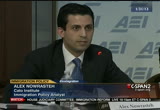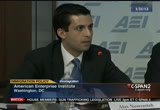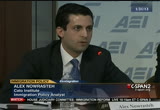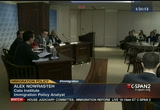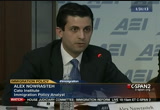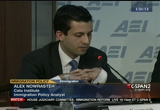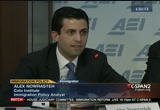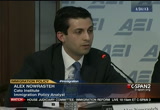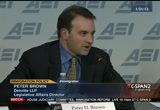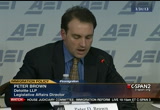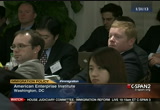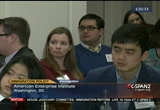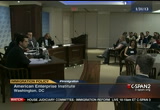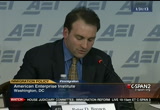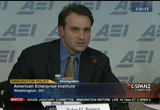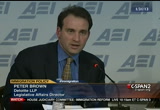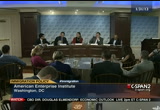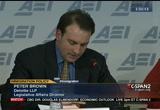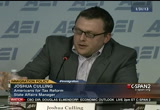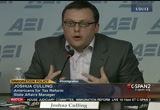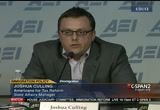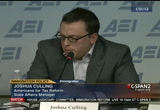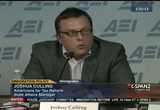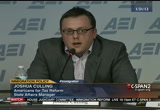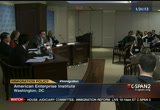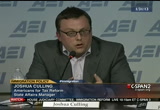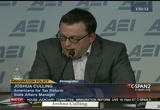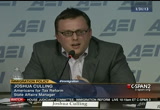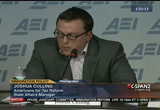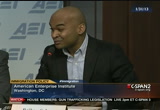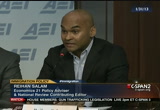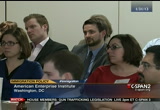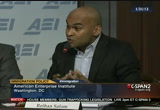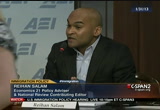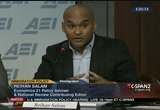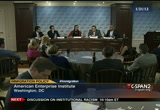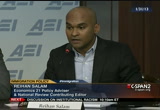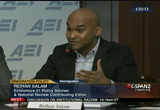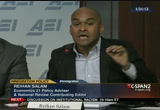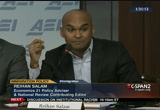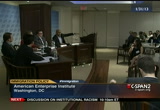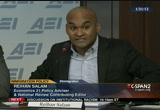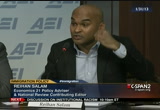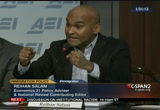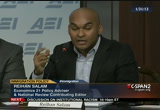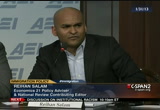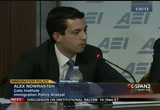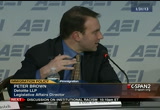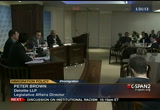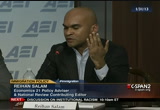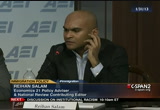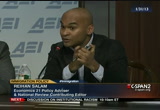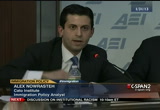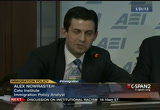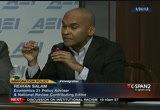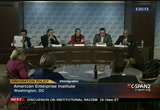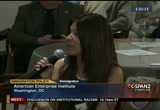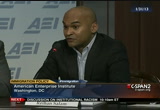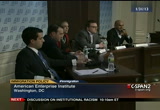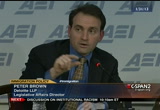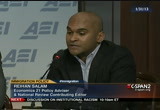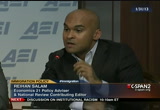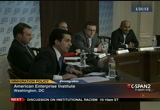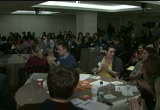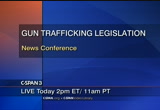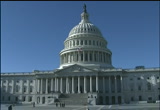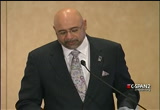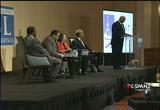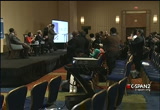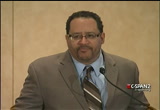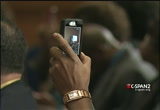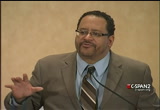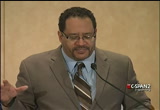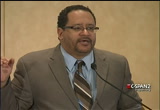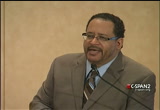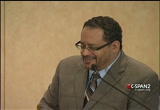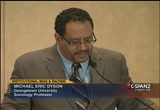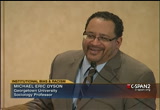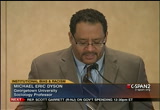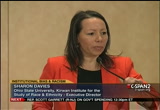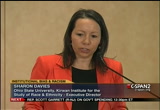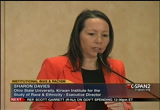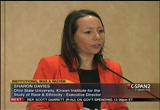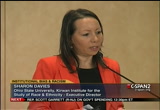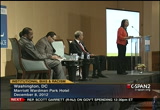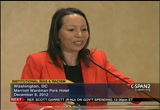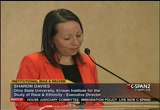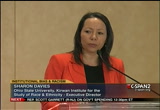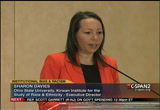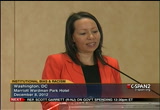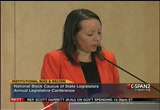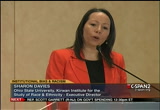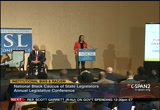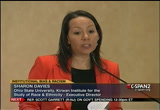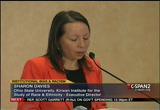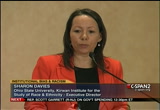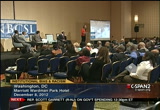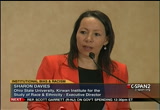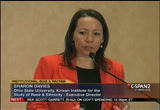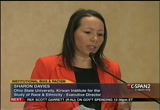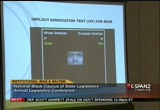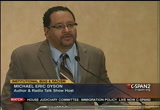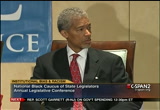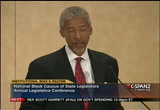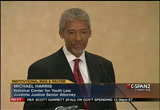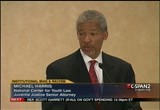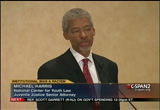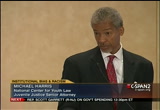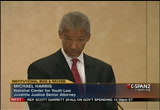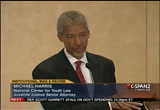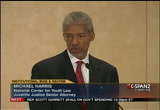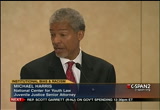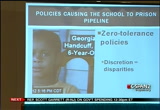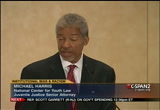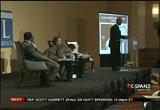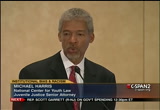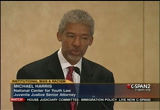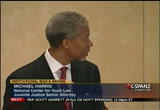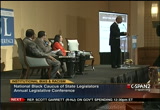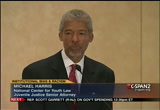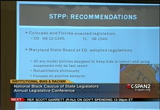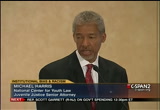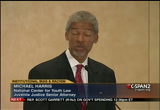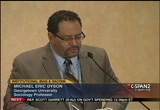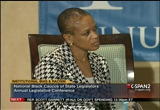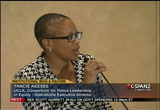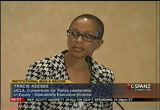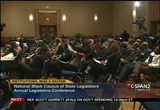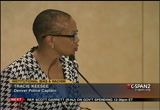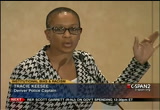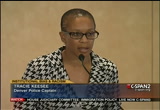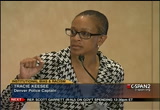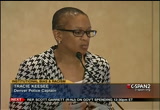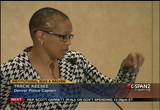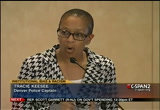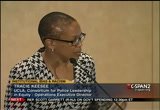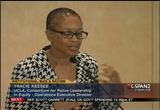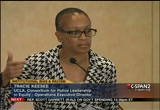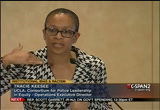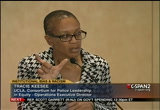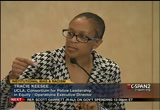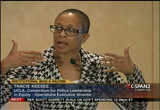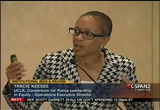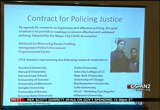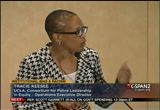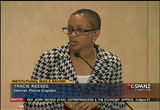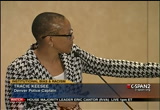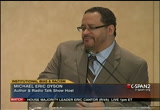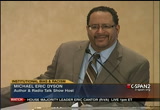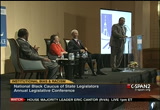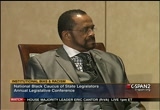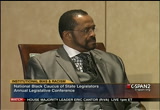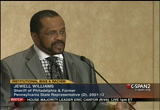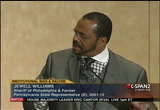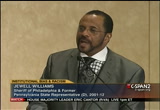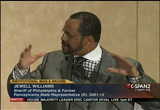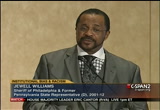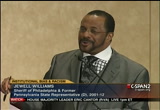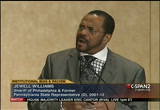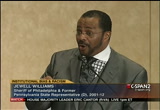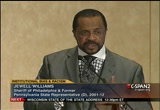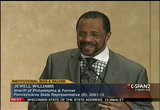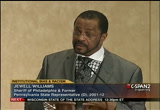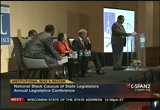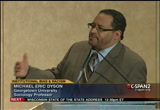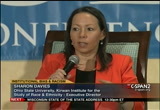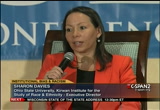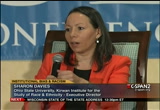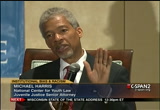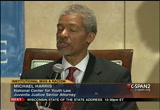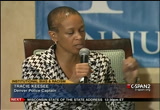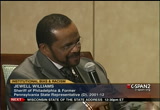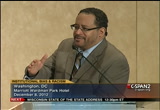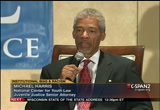tv U.S. Senate CSPAN February 5, 2013 9:00am-12:00pm EST
9:00 am
the reason is, immigrants have different skill sets than the rest of us. they have, all of them offer high skilled on the high-end. a lot of and also very low skilled on the little and. most americans are in the middle. this is been sustained -- sustained throughout american history. whenever can't open borders with europe, we have rapid wage increases over time to combined with massive amount of immigration. even more so than we are hearing things today. today the only group of americans who possibly have seen decreases in their wages due to immigration are the group of people with, 25 years old with less than a high school degree. that's about 12% of the american workforce over the age of 25. i think there are better things we can do to help these people rather than closing of our labor markets and international flows. another issue that a lot of people are worried about is crime. care about this all the time, illegal immigrants or unauthorized immigrants make
9:01 am
crime. but immigrants are on average far less likely to make a violent or property crime than nativeborn americans. there have been incarceration rates for those types of offenses, about one-fourth as high as nativeborn per capita. most immigrants or in prison or in prison for immigration violations are serious. swing a lot of people talk about that, that's the reason why they're in prison. what you do see a second and third generation immigrants, especially from hispanic countries, tend on average have higher rates of crime than other nativeborn americans. and it seems to moderate by the fourth generation. the very optimistic interpretation of this is that they are assimilating to america has on average more crime than other developed nations around the world. so in order to assimilate, they reached that stand with the exception of course our asian immigrants who, for as many generations as you can measure in the united states, have had lower crime rates. i must also compared to the irish immigration in the 19th
9:02 am
and early at 20 cents you can hispanic immigrants are some of the more peaceful ones who have ever come to the united states. [laughter] spent another issue a lot of people worried about is assimilation. it's one i share sometimes. the most important part of assimilation is language. let's take a look at this. most people in their word about immigration are worried about hispanic immigrants but that's the thing, that's the fact. by third generation can hispanic immigrants are on average, as far as we can do, 100%. that means your grandparents came from another country, the odds are the article at all the data, you are 100% likely to be affluent they're breaking down that's 70% english only, 22% bilingual. something about coming to america makes you lose, i mean america has been referred to before as a graveyard of foreign languages. that's happened in the past with every language from gaelic, which was brought over with some irish immigrants, the polish. now in the future it's going to happen again with spanish.
9:03 am
so if immigration numbers, people need to be restricted to i think there's a better way to go about it than the current system. the current system is dominated by quotas, restrictions, arbitrary regulations, inspections. some of them on the books going back over 100 years that don't make much sense in modern society. instead i think has free marketeers we should push for the use of prices to regulate immigration more than anything. if we have to regulate it in the first place. and specifically, i propose getting rid of quotas, numbers of immigrants and replacing it with a tariff-based system. now, a tariff is as any comments will tell you much more efficient than a quota-based system. if you want to do about international trade, almost all economists are free traders but they will give a quota to allow more damage because the quantity of goods and services imported is restricted and doesn't change based on the project would allow the quantity to change, based on
9:04 am
a fixed price, that is much were economically efficient. trying to argue and have government bureaucrats are get about specific numbers and the types and skills of immigrants the need to be allowed in the united states is probably somewhat to our discussion that soviet central planners had when they're trying to figure out the gaza plan the next you. information is very old, out of date, doesn't work very much. as free marketeers ever have to support some sort of immigration restriction or some sort of level on immigration of free and health people i think we need a tariff to do. one of the common criticisms of this is that people will be paying to come there, are they in effect paying for citizenship? they are already paying to come here. illegal immigrants pay on average to come in from mexico overland $4000. they pay them to smugglers. to come by sea mexicans pay $9000 but the simple america, over $10,000. for chinese immigrants come here illegally, the average is 25 25-$50,000. and those prices reflect the ability of -- to be deported.
9:05 am
they are willing to pay high prices to come in. that also includes the risk of course being smuggled in a liquid which includes slavery, rape, criminal abuse and other things. to avoid those types of problems i think a lot of these immigrants will be willing to pay quite a lot of money for the ability to come and work, anything the government should be able to capture a lot of that money rather than cartel. let's not ignore the fact that one of the biggest cost is the cost of waiting in line when a line exist for that, trying to pay lawyers and legal fees, fees to the government, brides, everything after i think we should replace the entire system with one feed, for people and health immigrants to come to the united states. now, good policy is one thing. but the more important thing i think is trying to figure out politicians want to implement the good policy. james buchanan, "the economist" who died earlier this month, he passed away, taught us the
9:06 am
politicians are interested in the own rational self-interest but they want to do what's good for them. so i think we need to convince i think more than anybody the gop about how to do this. i think what of the best way to do is what marco rubio said. he said the gop needs to become the party of legal immigration. ann coulter and laura ingraham and a lot of other critics have said you can never after the democrats and immigration. they will always go around you. there's a good way to do, it's supporting legal immigration, increasing th the number of gren cards, low skill, high skilled and unskilled. that will help do. if you want to see the labor unions, democrats and leftists really freak out, the republican party should advocate for massive amounts of legal immigration through guest workers to cope with in a big bind because it will do a lot to ponder coalition going forward. we saw that in 2007 when senator dorgan of north dakota introduce an amendment to kill the guestworker program which killed
9:07 am
that effort. 100% behind it. unions are behind it right now trying to prevent a low-skilled guest worker program from being implemented or put into a final bill. if you really want to become the party of legal immigration i suggest the republican party actually do it and go around the democrats, and that's the strategy. thank you. [applause] >> great. my name is peter brehm. thanks again for inviting me to speak at this, and deloitte. my new year's resolution was to be more optimistic, and so, so far to great things can immigration reform is looking like a very real possibility. we will see what happens down the road. and my michigan wolverines are number one in the country, most important, so go blue. we will see what happens saturday night. you know, when i was talking to a few folks earlier, they were saying to, they were saying to vote, why do you care about immigration, or what is your
9:08 am
interest in the? it's interesting, from a professional services firm, there's probably not a ton of awareness around the high skilled issues that we face and how it impacts just little bit about deloitte and/or from very quickly. we are a large global firm. we have about 50,000 employees in the united states, 180,000 around the world. and we are in for different businesses and professional services, of which a lot of which is within the high-tech deal. we are an accounting firm so we audit fortune 500 companies. we are a consulting firm which makes up a large percentage of our business. so professional services around the world with many, many employees in different technology fields and many, many people in santa cruz, computer science. and that's a large -- a large part of her business. we do tax returns were living and we liked tax advisor services your and so in our
9:09 am
business, we are not a products company your car business is people, people with knowledge, ideas, innovation, helping clients solve their most challenging management and technology problem. from around the world. with people who have industry expertise that we deploy in every time and quick manner. and time and speed is everything. so within our broad workforce, our larger u.s. workforce, you know, we complement our u.s. workforce with foreign workers. and mobility is very important, so we hire people from college campuses on -- we also use immigrant visas as well and green card. for people on h-1bs, or people, citizens working with deloitte. and then we also use, we look at people who have expertise and specialized knowledge from
9:10 am
around the world that we can bring into the united states. so we leverage other -- but it really is a matter of leveraging those to ensure that our clients receive the most timely modern and technology process so they can innovate as best as they can. you know, we all know the statistics about 20% of companies founded in the us had immigrant found. 40% of fortune 500 were founded i immigrant of a child, or an immigrant. and a lot of those companies are our client. so broad point is certainly for america to stay competitive in this economy we need to modernize and change the way we employ our talent, and that we encourage people who get educated in the united states, in colleges or working with universities, key people in the
9:11 am
united states, not encourage companies and people to go back to the home countries. so this issue has recently become an issue fo for deloitte. you know, we've looked at this from a broad prison for a while, but like other companies, microsoft, oracle, the high-tech compass, into, a lot of companies and services companies, you know, this is a recent thing given some of the challenge we've had to actually hire and maintain and fill needs. so as an intro statistic, we hire every year about 7000 employees, 7000 people out of colleges and universities. and that's still not enough to be able to fill the needs of our clients, given a tradition and turnover and things of that nature. sort of streamlined the process. we all know about the backlogs that exist right now and how long it actually takes from beginning to end, and the timing
9:12 am
of that and how quickly we can get people deploy to our clients to help them come again like i said before, solve that problem and innovate, which also by the way helps to create more jobs for our clients to be able to bring products to the market any kind of fashion as well is critical to our business. and we have seen sort of the economic imperative argument used quite a bit, postelection, that applies to all skills, all skills of labor. so within our workforce, again we have about 5000 employees in stem fields. a lot of that is within the computer sciences. and so policies that have been introduced for a while, starting to get the momentum that look at sort of the broad prism of, that includes science, technology, engineering and math, accounting down the road, but we'll save that for another day.
9:13 am
but to look at policies that really do streamline the process, reduce wait times, make visas more readily available, and really just makes the united states a more simpler place, a more business friendly place, to keep foreign workers were educated here, here as well as people, again, a nation that was founded by immigrants, to promote from unemployment stand for in order to make it a more user-friendly special. we've seen a lot of the proposals that have come out. definitely immigration week. we have seen the president's proposal, the senate gang of eight proposal, which includes a high skilled piece of the and we hope it gets the attention that it deserves in the broader, on the broader discussion. at reasoned approach, and look at things that, including things that are also interested other legislation. you may also see the bill that
9:14 am
was introduced i squared bill which was a lot of the positive interesting and things that would really help i think high-tech engine with and keeping talent here, one of which is waving the visa caps. right now h-1b visa cap is at 65,000. and will be interesting to see the caps as an indicator, economic indicator depend on when the campus it, these are sort of an indicator of demand at least some our perspective. and so two years ago that safety 5000 cap was hit in november. last year it was hit in june. and this year it's expected to hit very early, as well which shows despite the broad unemployment, unemployment and a high text and field is under 4%, so 3.4%. so the is that sort of demand out there.
9:15 am
how that plays and some of the proposals in the i squared bill, the provision in that which would threaten those issues as well. i'm guessing there's always trade-offs in a. there was a bill introduced across the goal line last year on per country, change is that per country cap for green card. and so that is also included in that as well. obviously, this seems like it's a sprint now, not -- intro talk about is a journey, not a sprint, but this week it come you can feel the momentum and the timetable has been escalated. as people have been doing this for a lot longer than i have said, just take a deep breath and we will see what happens. the other thing of want to talk -- touch him from italy perspective is not only is the u.s. workforce but the things we're doing in important like k-12, looking at things that would help encourage people go into these fields. you know, speaking of our firm,
9:16 am
deloitte, from a pro bono perspective we are involved with college summit, junior achievement, a lot of pro bono in skill based training. and that's a big part of our culture and who we are. the u.s. and around the world, other companies i know are very involved in that, sort of encouraging, encouraging people to go into this. that's figure out how to attract people into the s.t.e.m. fields, but even beyond stem, fill the needs of the business needs, and so, you know, that is also an important sort of community involvement, things that we really hold dear to our heart and see a sort of an imperative, that we are committed to from the leadership level on down. and i think that, you know, we can't just to close, our business is dependent on having the right people with the right skill sets that serve as our client.
9:17 am
and time in the market is important. ultimately, i think we will want to create a positive immigration experience for our people, whether that's the spouses and children are coming in with our employees, and to remove, reduce the wait time for the entire experience which has been as positive, i think for a lot of our people, to make it a positive experience both for the u.s. economically and for our employees and our firm as well. so look forward to your questions. [applause] >> i'm josh culling, americans for tax reform. didn't know that about you. and also looking for two indiana on saturday night. but that's not what we're here to talk about. waited to talk about immigration. so i will start by saying i love coming to these events. shortly after i moved to d.c.
9:18 am
because honestly because the author of open bar at the age of 22 was not worth passing a. i got to know a lot of folks. the events agree. it's a pleasure to be on the other side and get a chance to share some of my thoughts on the immigration issue. now, alex has covered sort of, he's the policy expert on this stuff from a right of center angle. we heard about high skilled stuff but i cannot want to talk about the politics of the issue and sort of how you get the republican party to lead on the immigration issue, to embrace the issue, to help be constructive and help getting something password may have failed in the middle of the last decade. so a lot of the crowd, more libertarian leaving, that's great. i consider myself a conservative but i love libertarians. i hang out with libertarians all the time did you guys are awesome, but the issue is
9:19 am
largely settled to sort of the libertarian community. libertarians believe in free market for labor just like they do for trade and for good. the business community is largely on board. some on the high skilled site, some on the low-skilled side, some across the board. that's would have been leaning on in our center-right coalition for the last decade. and it's not enough. that's sort of what i think we have failed during the bush administration, to pass immigration reform because we underestimated the power and the backlash of social conservatives, the grassroots, evangelicals, law and order conservatives, cultural conservatives. these folks met and our coalition whether we agree with them or not, part of sort of the big center-right republican movement. and i think that we're changing that this time and i think that's really important. so i want to talk about most, it would be relatively brief, is
9:20 am
how we speak to that section of the center-right or conservative movement, and bring them onboard with, for immigration reform. and i think you are kind of three or four major ways to do that. we need to talk about morality, the moral side of this, how this kind of breaks apart families. we need to talk about the idea of american exceptionalism, which not ever to grace. i tend to think america's kind of the greatest country on earth. i love this country, and i think a lot of the cultural conservative elements of the party agree, and i think it's a very salient talking point to talk about why immigrants want to come the to be part of our country. to participate in our economy and go to our schools can worship in our churches, serve in our military. i think we need to talk about the perspective of being a regional party which i think is what we would be destined to be if we write off asians,
9:21 am
hispanics, and other immigrant groups that want to come here. look at county democrat trendline, being a regional party is no fun. and then i think we should talk in one going to sort delve into a little more deeply in my few minutes is taking a look at the anti-immigrant groups that have sort of branded themselves as conservative when really they are not. looking at those groups, and their broader motivation, which is in direct conflict with social conservatives and cultural conservative issues. so i will quickly just talk about the first three and then sort of delve into the fair numbers u.s.a. center for immigration studies aspect of my talk, and then i will turn it over. so on the morality issue, you know, alex so the talk of a human trafficking. that is certainly a key part of it. that's an issue that is exacerbated by a restriction
9:22 am
immigration laws. it's profoundly sad and profoundly depressing, and really strikes a note with, you know, social and social conservatives. we're also hearing them is a portrait our current immigration system is fundamental anti-family. whether you have men come across the border illegally to work and they're unwilling or unable to cross back, to see the dems because they don't know if they be of the comeback, and work next in the field. you the field. yet kids are u.s. citizens because they're born here but how their families deported because they are noncitizens, undocumented workers. and those families are torn apart, probably never to be reunited. these are deeply emotional, deeply problematic issues with our immigration system. we can talk about economic growth all we want. that's basically my motivating issue in the whole immigration debate but we need to talk about the fact that families are being
9:23 am
torn apart, and that's a terrible thing. on the concept of, the effects of being a regional party, it's, it resonates with social conservatives who care about the supreme court and the appointment and confirmation or rejection of supreme court judges. you can't do that if you don't have the president come you can't do that if you don't have a u.s. senate. if we don't do better politically with the growing immigrant population in this country, we may win as every once in a while. we were probably be good for the rest of this decade with how the house seats our district and across the country but u.s. senate and the presidency are going to be a bonus every once in a while. and then you're talking about a whole host of cultural issues that are decided by the supreme court that we will be able to weigh in on anymore. that's a problem. on the american exceptionalism angle, this is something that i get excited about.
9:24 am
my friends, all my libertarian friends actually all make fun of me because i get all excited for the olympics. american flag in front of my house. i'm only one quarter joking, three quarters citie series wheo this stuff. i think american -- america is the great country on earth but it's inspiring that people are swimming across the river, packing into hundred 20 degrees -- one the 20 degrees truck has come are literally dying to come to this country to participate in our awesome system that we have because of our freedom, because of economic opportunities here, because of, you know, fleeing oppression in many instances in their home country. you know, coming to serve in our military. go to our schools, raise their families and our communities. that is a beautiful thing, and a lot of, you know, republicans who are more socially and culturally conservative identify with that stuff. it's a very inspirational
9:25 am
message that we take to those folks. but really what i wanted to kind of delve into it is the anti-immigrant, anti-immigration, some may say at the immigrant groups such as the federation for american immigration reform, center for immigration studies, cis, and numbers u.s.a. these are very effective grassroots lobbying advocacy and policy groups that have sort of co-opted the republican party. we sort of have witnessed that on a number of issues. you generally need to be in favor of a smaller government, lower taxes, for free markets, pro-life, for a strong sense. but one of the kind of check boxes that's been added to the litmus test has been immigration restriction is, and that's because of the hard work of folks that say to define conservative position as sealing
9:26 am
the border and being the restrictions, even deport people who are already here. but if you look at these groups, they don't have a conservative bone in their body. the founding principles of these organizations are radically -- they're essentially population control advocates who think that more people mean more carbon emission, means a dying planet. the guy who founded fair is a gentleman named john, a radical environmentalist who doesn't like people, period. not even that he doesn't like mexicans, not even necessarily, necessarily a racially-based thing. it's he thinks more people means a decline in vibrant. so this kind of tools to advocate for population control are certain immigration restriction but also being pro-abortion, pro-sterilization, pro-family-planning, he's an advocate of china's one child
9:27 am
policy because again, more people are obstructed. so he organized multiple planned parenthood chapter in 1960s. and 70 certain the sierra club population committee, and is a board member for zero population growth. he then started, started their -- started there. 800 number to all of his building this movement and couching conservative principles. and some of the board members are even worse. the executive director of fair refers to one child policy which i think everybody agrees is disgusting as, he calls an international family planning program. one of his board members, the board secretary of f.a.i.r. currently wrote a letter to the editor of new times in the '80s and said, i think this is a trickle, i think china has solved one of the most humane and -- policy -- that's unbelievable.
9:28 am
this is information that hasn't gotten out there because we sort of, it's just become understood that immigration restriction is the part of the litmus test. it's not. these people don't have a conservative bone in their body. they are in bed with unions. they're in bed with environmentalists, and they are radically pro-abortion. and, not pro-choice. pro-abortion. so this is something we're going to be pushing quite a bit, as we try and educate to the grassroots what does, what does the immigration restriction movement stand for? when you write them a check, when you take their talking points come as a member of congress when you invite into a congressional hearing, who are you supporting and what is the ultimate goal here? its 180° opposed to mainstream conservative thinking, and it's going to be a key in educating our team, the center-right
9:29 am
community, on, let's start with a blank slate and talk about benefits both economically for families, moral, american national security standpoint as to what a rational immigration policy is. so that's essentially all i have. i would, you know, i would advocate, or ask the libertarian kind of policy community in d.c. to continue to talk about all the benefits that immigration from an economic standpoint certainly, but know that we're not going to be up to do with just business community and just the free market policy. we really need to get out in the community, and as a friend says, president of hispanic outreach, do what he calls gringo in reach and talk to our folks about what a rational policy. ..
9:30 am
9:31 am
ideas. think about the first thing, the humanitarian principles at work. i want to throw out -- a lot of things that will make me unpopular and in contrast with these bedrock mainstream conservative principles all i'm setting myself up for a false alarm will do that. one thing i will throw out is about american exceptionalism. there are a lot of countries that accept immigrants. we definitely don't have the best immigration policy among them, not by a long shot and there are bangladeshis who died trying to get into india. india is not the most enlightened wonderful country in the world. they are going there because they have a better shot at life in india and bangladesh. malaysia has a draconian emigration policy but people are desperate to get in. this happens around a whirl.
9:32 am
economic migration is a very pervasive phenomenon because we did in a world in which there is entrenched poverty in much of the world. a huge number of people from patina awful, it is not a shining beacon of liberty and everything else but just happen there are large masses of folks who want to group from one place to another but when you see humanitarian debate, deployment of humanitarian immigration policy, it is funny because it is not the ideal humanitarian policy. every human is equal. the fact that you are born in guatemala does not mean you are any worse than an american but the implication of that for immigration policies which have open borders. one might say we did have open borders in 1805. we had a very open system.
9:33 am
it was closed steadily through the late nineteenth century but through the 1960s immigration and nationality, during that earlier period there were high barriers to entry if you wanted to be an immigrant the goods we didn't have communication and transportation network. that was a slow boat across the atlantic ocean. people deciding to get on the boat were making a real commitment and cutting themselves off from their ties and form an autonomous communities in this society and making tremendous sacrifices. was very different. we live in the era of diasporas and now works instantaneous communication. quite different in that regard. when a lot of folks in this room have grandparents and great grandparents who were immigrants, think about that influx. those guys were not superhigh skilled by today's standard. that is true. is also true that the skill gap between them and native-born americans was really small. the other thing is before the
9:34 am
1930s-40s wheat collectively decide we would offer social citizenship rights to folks wagging behind it all kind of important ways because there's a standard of dignity and decency in our society. one libertarian replies then we simply don't give legal immigrants entitlements to various welfare benefits to give undignified lives. we tried that in 1996. there was a clever law passed by house republicans that if you are an immigrant if you are a lawful permanent resident you don't have access to various social transfers. clever idea closing on a basic theoretical idea but you come to work, you receive benefits, that is how we do it. there's a sociologist at princeton, douglas matthews who does brilliant work, what has he found? what led -- what happened after the 1996 -- they offensive naturalization. there were a lot of people who were lawful permanent residents who decided wait a second, i am under attack because these
9:35 am
transfers and benefits of being taken away from me so i will become a citizen. so then the influx from mexico and more broadly the influx from latin america changed so that it tilted from being an unauthorized influx, illegal or undocumented to being a legal one because we provide opportunities for lawful permanent residents and citizens to reunify with their families not as much as my friend josh would like but we have a lot of opportunities for that. adult siblings--a slow process that does not go quickly but does happen. you have this shift from unauthorized water rise in that population. i don't think that is an intrinsic bad thing but it means for folks who believe we want to have some economic logic governing who comes into the country lost control over that a little bit so my view is close to peter's. my strong view is the united
9:36 am
states should have an employment based immigration policy oriented to the economic future. when you look at these anxieties about productivity going forward they slow from the fact a lot of it is from the fact that the improvement in labor quality is flowing down in this country. the baby boom generation was better educated than the generation before it. 25-year-olds entering the workforce have the same education level as 65-year-olds leaving the work force. that is not the case in various other democracies. certainly not the case in northern europe, it ought to be a source of concern. the trouble is when we are thinking about migration i encourage us to think of the future american work force. there are a lot of ways to think about the state. one is in terms of numbers. when you think in terms of numbers i am for high numbers rather than small numbers. another way to think about it is the composition of the influx and what kind of principles we
9:37 am
want governing the influx. canada has a population of thirty-five million, fifty-eight thousand folks coming rear, that is your.7% of population. united states get less in local terms, unless than south korea. let's go to the canadian number. let's say we go to 0.8%. that is 2.2 million people. the question is how the slice that time? is it family reunification for folks who were defending naturalized? do we say you're an adult sibling of american sibling, that is great. what will be your next fiscal impact over time? let's say you are coming into the country when you're 62 years old just in time to collect social security and other benefits. doesn't quite work that way but you won't be in the prime age work force versus someone who is 25 years old and went to imperial college london, have a pretty impressive skills that. a lot folks want to hire me and i will be working for a long
9:38 am
time. pretty healthy guy, i will be working until i am 68 years old. i will be pouring a lot and to those tax dollars and that makes the difference in terms of people less skilled if we believe we have a social safety net that has to be funded. take the immigration issue of of the table. lifetime net tax rate that you are putting into the system versus what you're getting out is going up pretty much no matter what we do. for the baby boomers the lifetime net tax rate was in the neighborhood of 20. for people who have not been born yet the next tax rate in a 70s. the question is you want to look at who is going to make a big positive impact in fiscal terms, a crude way of talking about it but humanitarian terms, having any immigration enforcement regime at all, we are doing something normative lee and sound so step 1, acknowledge that any immigration laws that a decent law-abiding person, someone who did some shoplifting
9:39 am
when he was young, that is not a bad person. there were 13.6 million people who applied for diversity in 2010. for 50,000 slots. at 13.6 million is an understatement because that was for head of household usually had some kids as well so multiplied that by 3 or 4. those are people who had to have a high school diploma. think about the number of people without a high school diploma would be happy to have that chance as well. these are not bad people. understand that not a single one of them is that bad person and to say we shouldn't allow all 13.6 million of them plus their spouses and children to coming in 2010 doesn't mean we are saying they are bad people. we are saying if you're going to have a limited number, it has to be a high limited number as high as 2.2 million, let's think coherently how we do the up those slots. let's say is high skill on
9:40 am
behalf of the folks working in high technology companies etc.. we are a decent generous country and don't wanted to be all those guys. we want some component of the humanitarian as well. why not target the 60 poorest most highly indebted countries in world. with that zambia rather than new mexico. mexico is a relatively affluent country growing quite rapidly right now. that is why net migration from mexico is roughly zero. that is one of the realities, immigration has changed. let's construct a program oriented toward those countries so those people can send remittance back home and it is going to be structured to have up flow so people who want to go back is easy for them to do so in the the people can take care slots. that is a more coherent way to think about humanitarian because those remittances will vastly overweight assistance by the united states or any other country. we are being backed into a corner, we are being backed into this idea that the immigration
9:41 am
agenda advanced on political grounds, we mentioned 10% of the population is foreign-born. my parents were foreign-born so i am part of the 12% of the country that insists people born in the united states, one foreign-born parents. i love -- i think i am great. i don't think immigration policy should be settled by me and my parents because of our interest. this is a vocal and active constituency that has been more intellectual and the people who might benefit from an immigration policy tilted toward the idea of net fiscal impact. that is why encouraging us to think about. in the framework one thing they talk about is we are going to have extra special path to citizenship for people who commit to our nation's agricultural stability. that is really interesting darren nation--that is interesting side path. what i hear from people is agricultural laborers. we sure do. in 1850, 70% of the american
9:42 am
population work in agriculture. it is 3%. it is possible that number will remain perfectly stable. is entirely possible that no robot will be devised that can pick strawberries. that is possibly true. is also possible the exact crops we grow right now we should always grow from now until the end them-the year 5,000 and the mixture should never change because labor is more expensive. if i were in that business that is what i would think. you expect me to stop growing lettuce in the imperial valley because it is the desert? that is nonsense with the federal government should keep subsidizing my water, they should keep it cheaper for urban consumers. that makes sense. similarly we should not have a policy -- of some agricultural workers will be agricultural workers forever because remember they are committed to america's agricultural stability but here is the thing to think about. remember how we went from 70% to 3%? a lot of folks wound up going
9:43 am
from farms to cities and what happens when you go from a farm to a city in the year 2012 and don't have a high school diploma or limited skills and a another sense, you have a really hard time, the united states is a country which 30% of the adult population has a college education and 10% of repay a high school diploma and there's a group in the middle. when you look at wages which alex referenced before the important thing to keep in mind of wages is it is all about commentary, good for high school -- high skilled workers, if i am a high skilled worker on want to order more take out because i want to work longer hours and make more money. that is why cities like washington d.c. works. my parents came to this country and washing dishes and driving every cabs and stuff like that, works and makes sense. there are two different dynamics at play. when looking at high skilled workers there are increasing returns to the concentration of skill. there's a great book called the new geography of jobs. what he is looking at is there has been a big divergence in
9:44 am
america between the d.c. metro area and san francisco bay area with people with college educations because those are more amenity rich and affluent and productive than other regions. when you are importing 2.2 million guys to drive down wages, that is great because -- just kidding. that brings lots of benefits to the country holdings and that impact tends to be pretty good and when you have michael clemens did work on software workers in india rather than united states. part of that is because they are more productive in the united states, more productive around other high skilled workers with less skilled workers the complementarity thing, the question is native-born less skilled workers who speak english are not necessarily competing with immigrants who don't speak english. they're not exactly the same. they are not competing. they are potentially complementary but the thing is we have a pretty decent size stock of people in this country who are less skilled, limited
9:45 am
english-language capacity and immigrants themselves. one joke from people is those are obviously not the people you care about, republican receptionist's because they look different and speak spanish so clearly that is why we shouldn't care because the net impact might be positive of allowing way of less skilled workers. what if we do care about them? what if you care about this group that tends to be socially and culturally isolated? we want to facilitate -- we want their wages to rise by a significant amount because they are complementary with other folks as well. so my crazy argument is this. let's have more high skilled immigration so it is complementary with these less skilled workers. if we are going to allow less skilled immigration let's be mindful and fought about who we allow in, so it has the maximum positive humanitarian impact and longer-term think about i am not john tonton, i don't believe we should have zero population
9:46 am
growth, bring it on. let's have 2.2 million people coming in every year but let's think about who is coming in. when you are looking at the way this conversation is going when you look at the fact the high skilled peace is not a prominent part of the gang of eight framework the agricultural stability piece is a really big part of this framework. let's be more skeptical. another thing to think about and i will finish his delegation. one thing we are talking about because mitt romney mentioned in the debate, the idea that you should staple a visa to any stem degree. what about a foreign stem degree that is really high quality? what about the fact that colleges and universities are delegating the authority to determine immigration policy for these guys. i flung out of a master's program, you got to help me or i will not be able to live in the united states. how about a kickback? a little silly but think about the delegation of this.
9:47 am
all these cliches we are pursuing are actually silly and for lee examined as we rush headlong into immigration reform, think about the quality this will give legislation and think about what happened last time we had comprehensive immigration reform legislation when we had the unintended consequences that flow from bertha. composition and numbers are different things. i am happy to have big numbers but the gang of eight framework sox. thank you. [applause] >> thanks for your remarks.immi.
9:48 am
what is the best high agree with what he said. we need to have larger numbers of high school people come to the country and we need to raise that dramatically or remove it entirely replace it with fees instead of quote ups. a lot of h 1 b workers are fed into the system and i think it -- one of the things that was said that is great also is increase the number of people in foreign countries who are educated and coming but not just take a look at stem or steam.
9:49 am
what is interesting is the department of labor the study of ten years what jobs will be needed in ten years in the united states and a a are off by a maximum amount every time. the market is better able to determine that and a bunch of people in the department of labor guessing what the next round of economic growth in the united states is going to be. if you were in 1980 or 1990 would you have guessed the internet would be a big thing in the future? probably not. definitely not actually. >> i will add to that, having a balanced approach where you have immigrant visas, non immigrant visas and reasonable provisions around that, we talked about removing the cap and increasing caps, looking at the market escalator idea, the middle ground in certain respects in terms of raising the bill, looking at increasing the cac,
9:50 am
if you hit the number, the provision, right now is 65,000, depending on the time frame, a certain number of days, 20,000 in a certain number of days after is that, that cap goes up again. folks in high school peace, meeting those, at a creative way, not a new way but it is out there as a way to look at demand and if there is demand and that threshold isn't hit you are back where you were. that hasn't closed. i certainly understand the immigrant visas, people here want a figure. >> a lot of the problem with tech companies, that higher highs skilled labor they can't
9:51 am
hire, there are not enough people to fill those jobs in the u.s.. the number rider is 80,000 most recently by the point is the education system sucks in this country and as a shorter-term fix we are not going to overhaul it overnight or have engineers and scientists that can fill these jobs by overhauling the education system overnight. education is a good sort of bridge, anything we do and immigration with domestic education reform, immigration supplements a lot of deficiencies in domestic education. >> the framework you hear from industry is wrong. we need x number, we don't have this number. they will always lobby for more. a situation in which they only have to pay x amounts, we prefer to pay less.
9:52 am
and if we look at canada and australia and the point system. there's a sense of who is likely to allow these people in. . one of the problems is you are tied to the measure employer has to exploit you. it is a terrible situation. i know many people who find it extremely constraining. and -- you can be an awesome person. this tends to be the way we think about it. it is true that particular technology would emerge and people who have high level english-language proficiency,
9:53 am
people who are reasonably well educated rather than people, agricultural laborers to explore the sector -- emerging economic opportunities. that would be a reasonably good that. not to say you shouldn't -- don't try to keep its superconstrained and give employers too much leverage, don't assume the person will be a programmer all their life. this person might become a hang glider or something else. that is a very good thing. you want to encourage people who are entrepreneurial etc. but moved it away from something like that. >> we have time for a few questions for the roving mic. please wait for the mic before you ask your question. >> i think -- what i am about to
9:54 am
say -- the key point, many countries have massive emigration due to war, economic concerns, big concern about selling more of american exceptionalism snake oil which may work, do that from another perspective, seems ridiculous. my question is international best practice, what can we look to for the international perspective who has done as well, don't tell anyone, but we did it because it was easy and the employer didn't want to pay tax and the truth is i didn't care but my -- a relative of mine was deported from england effectively so a lot of americans are working illegally as well because of the economic environment of the last nine years, international best practice, what do we know? >> interesting question. one thing to throw at is we tend to talk about immigration policy
9:55 am
but actually u.s. tax policy towards expatriates' is incredibly convoluted and a huge problem particularly if you believe as i do that the circulation of talent having americans live in other countries and bring skills and experience they diner in those places is a valuable things july encourage us to think in terms of net worth and transfer of knowledge more comprehensively but the point about best practices people often cite canada and australia and a lot of learning between those societies as well but what is noteworthy is canada has incredibly draconian emigration policies as relates to their guest worker program etc. so we tend to think of canada as squishy and progressive and also admit more immigrants, then united states does. one reason this has worked as a political settlement is there's rigorous immigration enforcement but in my view it is unimaginable. even someone who tends to think we have fairly tight immigration
9:56 am
enforcement i don't think is possible. you want to look at what is the dimension of best practice of some of our friends who favor more agricultural labor would think a lack of immigration policy is the best practice but from my perspective canada has its economic needs and works well on assimilation. canada has a large number of foreign-born people in its parliament. very successful assimilation of people of chinese origin etc. in their political and civic life so i think of them as a positive role model. >> we need to think of immigration in the sense of not what we can control but it is difficult for the government to get a handle on these things. we need to recognize a lot of people will come the matter what policy we set. we can set canadian policy or we can put in place guest worker visa program or a point system geared entirely toward high skilled workers. we can do that. we have a system that doesn't
9:57 am
last low-skilled laborers into the united states and we had a massive amount of unauthorized immigration in the united states. we have to tailor the immigration system to take advantage of that right now because these people will come regardless of at and a great example looking back, we need to make them portable for the workers and change employers but the world war i guest worker visa program you had a point in the 1950s with two million immigrants in the united states or a period of a couple years with some vigorous enforcement that acted as a funnel until the legal system you had that number decrease by 90% and border crossing decrease by 90% and the simple reason is you have a legal system to put them into. what you have now is enforcement without a legal system to put these workers into and as a person who believes in american exceptionalism we need to have a legal way to bring them out of the market and to make one quick point about american exceptionalism argument in 1990 according to charles hirsch and
9:58 am
who is a historian and demographer only 9% of americans according to last name were of english descent. 9% of americans in 1990 were english descent. we all speak english, we have an anglo-saxon common-law system, english influence culture. the largest ethnic group in united states right now by last name is german. we don't eat bratwurst at every meal but that is a great idea. we are one of the most heterogeneous and diverse countries and world. that is what i think of when i think about it. >> i agree with half of what alex said. it is really true that when you look at immigration enforcement particularly when you look at reform proposals people talk about we have fact taxes and fines and then we are going to measure the english-language proficiency to much else, who believes the federal government will do this constantly well? coherently separate out among 11 or twelve million, lot of the immigration advocates know that. they're issues move this off of the table and legalize the population and allow them to say they do these enforcement things just like we're not actually
9:59 am
going to do them. the only reason boston college propose an idea that is a punitive dimension to be in force. i encourage you to look it up but i think the other half of what he said i disagree with but we will leave that for discussion later. >> i have agree with what you said. >> two more questions. we're running out of time. keep your answers brief. we will take this one right here. >> good evening. i can attest to what peter is saying. i worked in the stem education route and agree with what you are saying. it is essentials to bring highly skilled labour into this country and as an american i strongly believe that this country is amazing and we need to start reminding every american we are exceptional but what is the point in trying to advocate exceptionalism to people who are coming in when we have so many americans who are legal, who are
10:00 am
u.s. citizens and quite the contrary. have you thought of doing something? we have a $16 trillion deficit, we have fifty-one million people on food stamps, our culture is an entitlement culture and yet we are going after a thirteen million people with an immigration problem. eyewall for vetting them. what about reverse discrimination? we are going to demand exceptionalism we should have it towards the immigrants when they come here legally or illegally and we shall so go back to americans who are u.s. citizens. >> are you talking about expelling americans? >> i'm for the notion citizenship. [talking over each other] >> i may be extreme but here's my point. how many of you -- [talking over each other] >> how many of you have traveled to historic countries? you come back to america you have a different perspective about exceptionalism.
10:01 am
how about reverse immigration? >> i did not support the deportation of american citizens. i would say this. if that were to be a policy, you would save hundreds of billions of dollars in the welfare state because individual immigrant, likely to use welfare especially when their nationalized american citizens, that is an interesting result. i don't support it. >> the broader point that is true is look at labor participation rate among illegal immigrants that are higher than legal immigrants and native-born citizens. to kind of move through some of your point and point out that illegal immigrants are people who come here to work and that is a fact. >> i have to say on the record when you are looking at different communities, looking at some american communities with low labor force rates, there are a lot complex historical reasons and to say that is the fault of these individuals is a lot more complicated than that. do i believe -- part of my belief will make the unpopular
10:02 am
that we have complicated special obligations to people who have been in this country for many generations and been subject to for example intense historical discrimination that we don't necessarily have to people born in my parents's native country. people in my parents's native country are equally human beings and they deserve recognition and respect for that but it doesn't mean the united states has the same obligations to them as it might to many americans who find themselves entrenched in poverty. >> one more question. how about david in the back? >> thanks. my question is about comprehensiveness. a lot of conservatives are superskeptical about comprehensive health reform law and financial regulation and whenever i hear comprehensive immigration reform i feel i am being tricked. there are good parts i like and bad parts being snuck into. why don't we go piecemeal and say we want high skilled immigration to this, border
10:03 am
control let's do this, why can't all be one law? >> i will say from our perspective we look at sort of comprehensive political imperative driving comprehensive in certain respects so i think four or five months ago if you told me immigration would be front and center i would have said no way. what are you smoking? that can't be the case. one thing we are thinking about in our community is comprehensive, we get that and that is great if you want to try for an overall peace of legislation but people who again have been through this many times are concerned what happens if it fails? than what? what happens to comprehensive? do you than piecemeal take parts of it and what happens to hy skills immigration? a lot of agreement on it.
10:04 am
a lot head nods, republicans and democrats say a green card or whatever the case may be, differences. and you can apply that concept to a lot of other parts of emigration. the political imperative is driving a lot of this sort of discussion, why comprehensive and it is a big hurdle. many people have gone through this many times. sort of now is the moment for that. >> i will be more blunt than peter. there is a passage in walter isaacson's to biography of steve jobs. what are we getting high skilled immigration? president obama corley explains it needs to be comprehensive and lead to address the undocumented population and he might have seen president obama's speech about undocumented immigration and what he gets on that front. my sense is it is fundamentally politics and remember flights of the population that is foreign born, a decent number are part
10:05 am
of the electorate and very engaged and this comes down to a matter of recognition and respect. there was a lot of bipartisan legislation being done at the start up visa and things like that and i think you are right. a piecemeal approach would be totally sane but from the perspective of the lobbyist it makes a lot of sense, let's try to attack this all at once part the because if you attach the attractive piece of legislation and consider the affordable care act, you saw a similar dynamic. if you saw just coverage expanding provisions in one lot it wouldn't look improving. you only have the revenue provisions of the affordable care act it looks like a massive tax greed. combine those with single piece of legislation it starts to look attractive. is the same dynamic and that is why we should encourage a more piecemeal approach and that is why it is unfortunate we didn't make more progress. who were the roadblocks to that progress? it would have been very good if the advocates of high skill recognize that and made noise about it but they're feeling was
10:06 am
let's put it to the side. usually they didn't feel strongly about that. >> i worry about the guest worker program. alex talked before, you need to deal with future floods. we can't just take all the undocumented workers and wipe our hands because you don't do anything to remove the magnets from immigration in the future. ten years down a road we deal with the same thing, undocumented workers we need to give another hand or whatever and with the afl-cio and some unions and left-leaning groups opposed to expanded guest worker program i worry that we do blanket half way to citizenship or legal status or whatever you want to call a band future flows out of it and don't solve any problems and as republicans and politics for the next ten years. >> i don't trust congress so you can't make and sign a contract to introduce the piece of legislation so the first thing that will come down, will be
10:07 am
high skilled or enforcement and if there is enforcement, they said by the way we are definitely going to do a low-skilled thing, we will do high skills, i wouldn't support the enforcement only because i don't trust them. they will stop after that and what we saw the last several years to do these piecemeal approaches a lot of them fail. the immigration act which moved the country of origin quote ofs, great law. so unfortunately it is a political strategy going on now. i personally -- doesn't matter if it is a road to an end but that is the way it is going right now. >> with that, thank you all for coming. there will be drinks in the lobby to come back and you can have a seat. [applause] >> we have live programming coming up to tell you about on the c-span that works. on c-span2 we will be live at
10:08 am
1:00 eastern, we have remarks from house majority leader erich cantor, a virginia republican will speak at the american enterprise institute. expected to talk about his party's priorities in the 113th congress. there will be live at 1:00 eastern on c-span2. an hour later the head of the congressional budget office, douglas homan wharf will talk about the release of the annual budget economic outlook live from headquarters at 2:00 eastern. we have it here on c-span2. house judiciary committee is getting ready to hold a hearing on immigration policy. that will get underway momentarily. you will see a live on our companion network, c-span2 -- c-span3. congressman patrick meahan will talk about legislation to combat gun trafficking live at 2:00 eastern. also on c-span3. >> julian loved her time in the white house. c-span in her memoir like a
10:09 am
bright and beautiful dream. the quiet, most wonderful time of my life. that gives you some idea how much she enjoyed being first lady and how she felt her husband had finally achieved the recognition he deserved. >> historian edith mayo on julian crandall mary brother's west point roommate ulysses grant, c-span's original new series first ladies:influence and image, public and private lives, interest and influence of the president produced with white house historical association, season i begins president's they february 18th at 9:00 p.m. eastern and pacific on c-span, c-span radio and c-span.org. >> coming up next the panel discusses institutional bias and racism. you will hear from a group of analysts from the fields of education, race relations, politics, to talk about implicit bias on decisionmaking process
10:10 am
and recommendations for addressing it within the educational and criminal justice systems. this event was the closing plenary session of the annual legislative conference of the national black caucus of state legislators held in washington. it was moderated by author, professor of radio talk-show host michael eric dyson. it is 2 hours and 20 minutes. >> good morning. it is my distinguished pleasure to introduce our moderator this morning, dr. michael eric dyson, author, radio host and political commentator. he is one of the nation's most influential and renowned public intellectuals. professor, dr. dyson, some of the most prestigious universities and colleges from brown to knoxville college,
10:11 am
columbia, university of pennsylvania. and georgetown university. at georgetown university in 2011 he received wide attention for the course he taught, sociology of hip-hop. his exceptional work has earned him the american book award and the naacp college award for outstanding literature, literary work twice. dr. michael eric dyson is a literary genius who can write about any subject such as the late civil-rights leader malcolm x and martin luther king, reflections on hip-hop, debating raise, the hurricane katrina catastrophe, if you turn your t
10:12 am
b on uconn also find dr. dyson on virtually every major media outlets including today's show. and the o'reilly factor. and even wrapped city and he is a contributing editor to time magazine and has a post in an hour-long news program on npr. called the michael eric dyson show. nbc -- nbcsl, join me in welcoming our commentator, dr. michael eric dyson. [applause] >> thank you, president elect armstrong for that very gracious
10:13 am
introduction. it is an honor to talk about this very serious matter. and institutional racism and dismantle institutional racism in the twenty-first century and an extraordinarily lineup of panelists, engage in any extended introduction except to say obviously when we're talking about a society. and multifaceted as ours, there is undeniable evidence of the extraordinary evolution of the democratic institutions and populations for the population of the country. the institutional product we have made, the projects we have observed and expansion of
10:14 am
democracy we have helped facilitate must be juxtaposed to the persistence of malignant and often unconscious forces that continue to subvert and undermine the best potential we have as american citizens. it gets in the way and we don't know it. we could become walking down the street with some skills in your hand. and then the phantom, in visible bias becomes concrete and definable. the anatomy of bigotry takes shape and the repulsion of an repugnance toward black or latino or asian or other bodies just as figments of imagination projected onto the screen of history and what goes on unconsciously, what is a stereotype takes shape and that stereotyped becomes lethal and
10:15 am
deadly when one person seeing another person acts on those stereotypes, that's implicit bias, that unconscious racism that is ethnic repulsion and all of a sudden all this theoretical and abstract stuff becomes concrete, stuff you talk about in classrooms spills over in a bloody fashion on to the street so it is important to talk about that as you sit around the constructing abstract conception of bias and implicit racism and institutionalized forces of oppression, that stuff is more the stuff you find in a textbook. you all know that although it becomes more difficult to legislate in the face of the shift from concrete expressions to implicit bias and unconscious racism and yet the institutional matrices that house that bias have to be talked about and we have to talk about mechanisms of
10:16 am
distribution and ways this is distributed to the culture consciously and unconsciously to manifest itself. we got folks here to break it down. i am just a quiet director. they are going to break it all the way down but that makes the difference. play your music too loud, get shot. in america. right? what is going on? in the unconscious of many people's souls, minds, sitees that they feel obligated to behave in a certain fashion to exercise lethal consequences on the bodies of our vulnerable young people in our population and then of course to talk about in a more specific sense how even before then, when we speak about school discipline and the ways in which young children are treated, young people are
10:17 am
treated, amnesty international to report 15 or 20 years ago suggesting the same problem sally and johnny in terms of mainstream white america are hit on the back of their hands for, don't do that again, young black and brown people and the increasingly asian folk are redirected toward criminal justice system, toward the tension, then you get marked and stigmatized and when you get mark and stigmatized you become eligible and vulnerable for institutional if you will criminal behavior. institutionalized criminal activities, institutionalized criminal realities. you get put in detention, that is a warehouse for schools, become warehouses and pipelines for detention and jail and prison and how do we stop
10:18 am
kicking kids out of school? zero tolerance policies. no such thing as zero tolerance. there will always be an exception when you run into things. when you are in control. always going to be an exception. any rule made there's an exception. even jesus got mercy and grace. you should have heard the sermon. i'm not trying to preach this. is not sunday morning. i am a baptist preacher. i am not preaching tomorrow so i might take an all-out on you right here today. we have these brilliant people to talk about implicit bias, unconscious racism, function and role of those realities in our lives when young people get stigmatized, put aside, tracked in different ways and they become victims of a vicious
10:19 am
process and institutional expression that is not often talked about and when we do we get blamed for being the racist. a malignant persistence of a certain racial animus get accused of being the perpetrators and perpetuated the of the legacy of white supremacy and social injustice and racial inequality. we just have to keep fighting past that. we are in the age of obama. but one great black man living in a public house with his family cannot turn the tide. he is a great man and devoe brother is going to be public housing let it be 1600 pennsylvania avenue, no doubt. no doubt about that. i just want to see him come out one time in full size with a housecoat on. with his tall cap. but that is just my fantasy.
10:20 am
that is just my fantasy. they are wonderful, beautiful, brilliant people, the first lady, the president and their two wonderful children. we want all families their black and latino and other first nation indigenous people to be treated with equal respect and dignity. we want all of our kids like sasha and malaria --malia to be treated with due reverence. we talk about these issues because they're extremely important. i'm going to introduce our speakers in the order in which they will appear. first of all professor sharon davies is a very gifted scholar. with a harlem pitt stone scholar and editor of the columbia law review while in law school at columbia. you all know about that and then of course when barack obama became the first black editor at
10:21 am
harvard law review people made a lot of hay about that because they understood the academy broken to the larger world so you understand what pedigree she represents. as a young people say you know what her seat is. after graduation she worked as an associate attorney for stepco and johnson in d.c. and barrett smith in washington, she served as an assistant united states attorney in the criminal division of the united states attorney's office in the southern district of new york which is widely considered to be the premier u.s. attorney's office in the country. if others are here from other u.s. attorneys offices we apologize for her superiority. [laughter] >> calm down. i am a lakers fan so i get that all the time. miami won one, that is it. she joined the faculty although i love lebron and those brothers
10:22 am
and dwyane wade and chris bosh. she joined the faculty at ohio state university in 1995 and was awarded tenure in 1999 promoted to full professor in 2002. her primary research is in criminal law procedure and published widely in a variety of journals and places where her ideas about critical, legal and social matters have certainly been expressed. i am going to have sharon davies come to the podium and share with us for 12 minutes about her ideas about our topic, she will lay the groundwork on unconscious bias and implicit racism so legislators and the rest of us can better understand how unconscious bias manifests itself in structure racism and systemic discrimination we have been talking about already and
10:23 am
how people can unconsciously act against their conscience principles and values. you think you're doing one thing, i am a racist, i am clear and clean and like people of color and at the same time beside you -- individual attribution of good things to a person consciously, unconsciously a lot of stuff going down. she will address these disparities and provide description for a legislative address barriers to institution, that sounds like a book. you can break that down in a book which will break down as well. [applause] >> thank you very much, dr. michael eric dyson. it is my pleasure to be here and i only have 12 minutes a level jump right into this introduction to the emerging body of learning that is around unconscious bias. the way i decided to structure
10:24 am
my remarks today was to have you all actually participate yourself with a few slides that are intended to enable us to see how our brains actually operate, always in which we aren't aware, often times. the body of emerging, the body of emerging learning about unconscious bias is about the idea that we have associative thoughts that happen automatically, very quickly and often times without our even realizing those associations are firing off in our minds. that can be as dr. dyson said a serious matter, even a legal matter depending on what those associations are. let me start this by talking about a book that explores this somewhat, a terrific book, a
10:25 am
book by a nobel prize winner for his really revolutionary work in helping us understand that we do not make judgments and decisions as rationally as we tend to believe we do. this book was called thinking fast and slow. a great book because it makes accessible to the cutting edge of learning about bias. in this book, for a layperson like me, he very kindly describes the way in which the brain works in two ways, two systems, a system 1 thinking and system 2 thinking, system 1 thinking operates automatically. very quickly. it works to construct a coherent interpretation of all the data our brain is processing in any given moment.
10:26 am
it operates without conscious effort and it operates without voluntary control. the poor quality of systems 1, fast thinking, is something called associative memory. what that means is as we grow and mature and i -- our thinking is honed, we begin to think about world associate of lee and not even realize we're doing it. by contrast system 2 thinking is another very different way in which our brains work. this is slow, this is deliberative, this is orderly, this is effort, this is the systematic scheme of thinking we bring to our most arduous tasks. we like to think of ourselves as
10:27 am
rational, deliberative thinkers, we will associate with systems to thinking. but what daniel and his colleagues's work has shown us is that very often our brain is utilizing system is 1 thinking far more often than we realize. narrow scientists estimate that the human brain takes in eleven million pieces of data in a second. eleven million and we are consciously aware of homely maybe 40 pieces of data in a second. that means our brain is doing a lot of work for us that we are not consciously aware of including making associations between things. if you look at the screen this will become apparent to you. we think in systems 1 thinking we think very quickly and associate things with each other
10:28 am
like lime green, lemon yellow, sky blue. this is our associate of processing and for those who knew the answer was blue, says phosphorus -- she knew that without any effort at all. that appeared in your brain as soon as you saw the words cause i. that is an example of how we associate words with one another and we also associate categories. let's try another slide such as night and day, black and white, young and old, not one of you said something that was different from the crowd and none of that took any kind of hard effort. that is an example of how we sort things categorically and associate them with each other. we also in our systems rear range things without realizing
10:29 am
that we are doing it and we do it automatically and effortlessly. that means associate of thinking is meaning making thinking. let me show you a slide. i think that is all right. i am going to move on. let me say -- and i am going to ask senator cook if she would to help me with this next one. if you read this green, just see if you can make sense of what you see. read it out loud. >> i believe that -- [inaudible] >> more of you join senator cook and i was expecting but you could see that for those of you who did read it out loud that it
10:30 am
didn't seem to take you any work at all. think about that for a second. every word on the screen accept i and was was greatly misspelled. how is it possible that the human brain is still able to read that so easily? may be just that senator cook and the others who read it out loud are particularly bright. let's try another one to test for ourselves and this time my last the whole group to see if you saw something a little harder, not one sentence but a whole paragraph of sentences that are misspelled like this. here we go. all together. [inaudible]
10:31 am
[inaudible] [applause] >> we think we recognize words in a particular way but actually we recognize them associate of we. once we become adept readers, we are not linear. this is because we are quick thinkers. that is a great thing. it can be a problematic thing as i will explore in a minute but let's think about the contract in system. ..
10:32 am
10:33 am
tensed up. your blood pressure went up a little bit. your heart rate increased and your pupils dilated as you were trying to solve this problem. and they would only go back to their normal size once you solve the problem or given up. so that is an example of the effort, at least of systems to to focus mechanism which is quite intense, and very, very helpful. some of you may have solved this problem in your head. does anybody know the answer? [shouting] spent 408. >> very good. now your pupils are all back to normal. and this next screen is an example of the famous test which
10:34 am
is designed to show u is that se things we do very, very quickly, other things we do less quickly with systems one and systems to thinking. so for this, senator, let me ask you if you have any problem reading those words out on the screen very quickly. >> yellow blue orange black red green. >> no problem at all. and we would be able collectively to also call out color, even without the assistance of words. so this next screen is designed to show you that. senator kirk, can ask you again to call out the colors that you see, or at least some of them that you see on the front of the screen. >> and i don't need to get all fashionable with a description of the terms. i'm going to go left to right, green red purple, yellowish
10:35 am
green purple brown, red purple green, brown red line which yellowish green, green purple brown, purple green green. >> okay. fast but maybe not as fast or do you notice you had to put more effort into calling out those colors? so that tells us that the associated connection is not as strong as it is when we see a written word? but what happens if what we're trying to do is actually run counter to powerful associative mechanisms? the next screen is designed to allow you all to see that, and what i'm going to do is on going to ask you all to ignore the word and just pay attention to the colors, and call out the colors as senator kirk did, this
10:36 am
particular screen, so again, ignore the word. just call out in order the color of the word that you see displayed on this screen. altogether now. green, red, purple, yellow, purple, brown, red, purple, green, brown, red, yellow, green, purple, brown, purple, red, green. now, that was hard, wasn't it to? it was hard. you could feel come you could feel your brain almost at war with itself. because your automatic processing mechanisms, which identifies with words so swiftly finds it intention with the task at hand. in order to make it through this exercise you had to slow your brain down. and if you don't slow your brain down, you will be prone to
10:37 am
error. so that is actually something that we really need to focus on. it means that our systems want automatic mechanism is an important thing, as is our systems two thinking. but we really need to be careful about our proneness to error when we rely on it unthinkingly. now, systems one also has a possible problem for us, and that is that we intensely focused with systems two -- unser, systems two thinking, we're utilizing that intense focusing mechanism of ours. but when we do that, we can also make mistakes. we can fail to see things that we normally would see because we are so concerned with the task at hand. those of you who think subjects as learned drivers, example. we know that driving becomes
10:38 am
habitual almost, unthinking, after a certain amount of experience. but even experienced drivers when you're passing an 18 wheeler on the highway will suddenly rely on systems two to focus on make, to navigate that safety. if we are driving with a youngster as young, any stretch driver in the car, we will as social beings we will instinctively quiet down so as not to distract the individual intent focusing mechanism for getting past that 18 wheeler safety. and so, so this is an example of how when we focus on something, we take our eyes sometimes off of other things. now, i want to show you a video clip that really demonstrates this. now, some of you may have seen it, and if you have don't ruin it for the rest of you because
10:39 am
i'm going to ask those of you who haven't seen it to count the passes that a team addressed in white that you see on this video clip, and we will go to youtube to access it. so here's what i really want you to do. i want you to see that there are two basketball teams on this court. one is dressed in white. the other is dressed in black. and i want you to only focus on the teen dressed in white and count the passes, the number of passes that the teen dressed in white makes to each other. and i'm just going to warn you, it gets a little complicated as the teen dressed in black as also throwing a basketball around. so see how you can do though, and count the number of passes, and after we do, we will stop in
10:40 am
seattle everybody did. okay, here we go. count the number of passes the white team makes. >> okay, senator kirk, do you have an answer? [inaudible] spent 13? 10? okay, some say 12. most -- >> i only saw 10. >> the answer is 13. it's hard, right? but for those of you who got that right, did you see the moon walking bare? [laughter] play that again. this time watch for the moon walking bear.
10:41 am
[laughter] >> there he is. >> i didn't see it. >> for those of you who didn't see that moon walking bear, i was there, i've shown this video clip to a lot of audiences who don't see the moon walking bear when they are counting those passes. how could we miss something as obvious as that moon walking bear? this tells you something about the intense focusing mechanism of systems one thinking, that we can be so focused on one thing, and also thinking socialistic but what we're focused on a, that we are blind to other things, even things that are as obvious as a moon walking bear.
10:42 am
so that tells us a little bit about our brains and also how we have come we have to be very careful about how we are thinking things through and whether or not even as we focus on things, we may take our minds, our eyes off the ball, really. and i think i'm going to have to finish up pretty quickly. but the other folks on the panel will be able to try all this learning about the brain to concrete situations like how it might be that police officers see something that's not there. or george zimmerman might be danger when there was no danger in the body of 17 year-old boy. or how teachers may perceive danger and disciplined scenarios that actually, if -- it's
10:43 am
something different from what they believe turns out that race is one of the categories that has enormously powerful it associated with meaning for people. some of the best evidence in this, implicit association test that was devised by scholars at harvard university. and this shows us that americans, even americans with the most sincere and strongly held gala carrying principles will sometimes think, will often think, associated lead when they're thinking about race. and so this is an example of a slide you can find on the internet when you plug in association test. that was a test that was designed to look at response times. how quickly do takers of this test associate, for example,
10:44 am
features that have black features with this word as opposed to bad words. and how quickly can we associate white or convocation americans, good words as opposed to bad words. and now hundreds of thousands of people have taken the implicit association test, not just studying racial associations but also gender associations, h. associations, there's a great number of associative thinking that have been tested here. but the results are really stunning. they show that 75% of americans have a robust association of white with good and black with bad, and very disturbingly that even black americans will have many of those internalized many of those things, against their own groups. i think i'm going to stop there,
10:45 am
and leave it to my fellow panelists to connect the dots. thank you. [applause] >> watch out for the dancing moon walking bear. [laughter] that will preach in his sermon as well. fried chicken does anybody associate that -- [laughter] >> okay. yeah, i live up to that for sure. that's a brilliant presentation that professor davies has given us. will be able to dig into that and talk about that tremendous discussion of systems one and systems two a bit later. the analytical way of thought, and what that actually leads to. so some of our other panelists as she is indicated will help us understand this. for instance, we will bring up
10:46 am
now senior attorney for the national center for law, michael harris, will discuss how biases play out in education, particularly out unconscious bias leads to discrimination in regard to black and brown males, concerning suspension, expulsions and the school to prison pipeline that i touched on briefly. he is a senior attorney specialize in juvenile justice, reform. before joining in cyl. he served as deputy director of the haywood burns institute in san francisco working to reform juvenile justice system. he's worked in california and washington to reduce racial disparities and juvenile justice system using a collaborative process to affect systemic reforms. prior to his stint at the burns institute he was a staff
10:47 am
attorney and assisted drug of the lawyers' committee for civil rights in san francisco. graduated in 83 from the hastings college of law. in 1980 graduate of ucla, a former reggio super smith law fell a signed legal services of south-central tennessee. so his extraordinary experience ties to his analysis of this matter come is extremely important to its welcome them to our podium now. [applause] >> i'm just going to pick up where she left off. i'm just going to take what shee told me at a private replicate of that impacts the school to prison pipeline. so of course you all know your family with the term the school to prison pipeline that basically what we're talking about when we say that is that what you started off as a snowball and has grown into an
10:48 am
avalanche, policies and practices that pushed our use of color out of the schools. this is something that has started as a philosophical change at the school level. whereas before, when i was in school, and many of you, when kids get into a fight, when we yelled at each other or we cussed at each other, ma or we were just unruly in the classroom, that was handled at the school. we stayed after school. we ran some laughs. we did something. but summit on the school staff took care of that. now, any school districts across the country, for that very same behavior, people are arrested or expelled or suspended, and this is what we are referring to when we talk about the school to prison pipeline, that transition, the philosophical transition of excluding kids for minor misbehavior as opposed to respond to the misbehaviors there on the school campus. now, what's important to
10:49 am
understand about the school to prison pipeline is, affects certain students, and dr. dyson touch on this already, it affects certain students more than others. the students it affects most are black students but it also has an effect on brown and asian students. so that our racial disparities on who is arrested on school campuses, who is expelled and who isn't. we know from the research, and there is a great study that was released recently that black students are suspended at two to three times the rate of white students. so we know that disparities are enormous. and those are attributable to a number of policies that set up the school to prison pipeline, and i'll touch on those in a minute, but it's also attributable to what was just described and what we will talk about a little bit here, is implicit bias. because the implicit bias comes into place whenever there is discretion and decision making. and so at every point along the
10:50 am
way when you talk about suspension, expulsion, and arrests, someone has some discretion in most cases on whether or not they will go forward with that discipline. and when that discretion is huge, implicit bias comes into place. so we had a very excellent one on one on how our brain works, analytical and associative. so we know some things about implicit bias already. since we had a course i'm just going to touch on it quickly. so first of all we know that most teachers have low expectations for black students. and students of color and gender. so what that means is they expect them not to study as hard. they expect them not to do as well, and expect them not to try as hard. and so the result of that is they will not put the effort into the students when they struggle. we also know that there's an association, stay with me now,
10:51 am
and association meeting there's an implicit association, without being consciously aware there's an implicit association between black students and criminality. so just like she was just saying on implicit association test, there's an association between black and red and white and good but there's an association between black and criminality. so already there before you step on campus for the very first day, you have these headwinds pushing. if you're a student of color. so it also already know that the brain, this is from brain science research, they can look at your brain and do studies and show you pictures. so we know when people are shown pictures of black people, part of the brain that gets activated were all the blood goes, a lot of oxygen goes, that part of the brain is called the and they do it. that's the part of the brain that respond when you see a tarantula spider or a big gigantic snake. i.e., the part that deals with
10:52 am
pashtun in contrast when people are study pictures white people, the part of the brain that gets activated is the part of the brain that deals with images. so, therefore, you can just think about what the implication of that is. so if you have somebody, teacher or principal who is dealing with a situation of discipline, and both parts of the brain are engaged here now, one part of the brain when again with black students at the part of the brain that deals with fear, one part of the brain is activated when again with white students as a part of the brain that cause of empathy, you can see how that can lead to different results. so these are the things that are in the brain that caused racial disparity. there's also a study done of police officers and probation officers. because remember were talking about the school to prison pipeline. so these things affect teachers. the effect principles. they affect teacher -- sorry,
10:53 am
they affect law enforcement that are stationed at schools, and they affect the other professions in the juvenile justice system. so this study was done and professionals, law enforcement and probation officers, and they were given a facts a new. and one was said the student is why. the other student is black. so they split up the group in half and asked what would cause this bad behavior that was described and, in fact, may. so what they suggested was a cause of the bad behavior of a half of a group that was told the behavior was that of a black student was these were internal things, that the boy had bad character. he was a bad kid. whereas in contrast, very same fact pattern, when they were told it was a white student, it was external factors. they attributed to a bad. group, being associate with the bad peer groups. or humming from a broken home. so the implication is both extra
10:54 am
things can be dealt with and address, so, therefore, it's much more likely that particular person could be helped and change. their behavior could be changed and what has it that someone who is just bad, there's nothing you can do to help. so all of these are the ways in which implicit bias affects decision-making in the school to prison pipeline. so i want to talk about for things structurally that our policy that lead to the school to prison pipeline. there are other factors, but these are the major ones in my estimation. so first and foremost, $0. we've all heard about zero-tolerance. i don't need to say much about what that is, but just understand that zero tolerance came about early on and it was brought about basically a lot of time that a new york city mayor giuliani started with a broken windows, or any of you familiar with the broken windows approach? so basically that three was you
10:55 am
have to stop small, insignificant rule breaking, lawbreaking because if you don't it will escalate and become much worse. so that was the general philosophy 90. so zero tolerance in that context. in the '90s, the federal government passed a law called -- in 1984. that law said if you want federal money for your schools, if you receive federal money must adopt a zero-tolerance policy. but it was only required that you adopt a zero-tolerance policy for weapons. because all these people have the notion of broken windows but expanded it out so it wasn't just zero-tolerance for weapons. expanded it and they made a zero-tolerance for drugs, zero-tolerance for a call, zero-tolerance for tobacco. zero-tolerance for fighting. and so as a result, zero-tolerance was basically means you have harsh punishment, no ability to deviate from the
10:56 am
preset punishment. so anybody that commits that punishment -- excuse me, commits the offense, gets that punishment. and so you have this draconian response to very minor misbehavior. and so you've all heard stories about how zero-tolerance plays out in ridiculous ways. so i have a picture here of a six-year-old from georgia who had a temper tantrum in school, and as a result of that temper tantrum, the police were called. she was handcuffed, taken in a squad car down to the police station because she had a temper tantrums go. so this is how zero-tolerance plays a. and it's not coincidentally that generally it's the black kids that this happens to. the one of the things we know about zero-tolerance is they said they would make things more fair because the response is the same for everybody, it's mandatory to respond in a preset
10:57 am
way. that should make it fair and take the discrimination out of the. but what we saw instead was, for the mandatory offenses, actually it got better. but for discretionary offenses at the same schools, because they have put in the punitive approach to getting with misbehavior, the discretionary we sought increase in racial disparity, and we sought increase in the number of discipline. so zero-tolerance has been a disaster. and i'm sure dr. dyson will touch on this, but the scholars and universities have shown that zero-tolerance has not been shown to improve school safety, and it has not been shown to improve outcomes for the students who are excluded, or the students who are left behind after the discipline. so the next policy, i'm going to speed up because i'm not a limited time, is -- this goes
10:58 am
hand-in-hand with zero-tolerance approach but because the notion shut down this suppression to push outcome you have to have people in place to do that. and so what we have seen across the country is a huge increase in the number of police on campus. and asked that has happened with seen an increase in the number of arrests and number of suspensions. and, of course, the disparities are always there. so students of color much more likely to be arrested than white students. the other side affect of, that causes the push-up from the school to prison pipeline is reduction in resource but because those law enforcement officers were on the campus, they have to pay, that money comes out of the budget but otherwise would have gone to programs, activities, extracurricular events that were the types of things that keep marginal students, students were
10:59 am
on the borderline academically that may not necessarily be completely engaged. but if they had a chance to star in a school play, or if they really good in sports, or if they were maybe in the court and they could sing well and cashing in the course and get recognition and acknowledged that for the, they will continue to go to school. but now all those things are gone, or in many places it's not gone, cut down, and those lifelines are gone. and students are leaving because of it. so that's a major contributing factor as well. and then this one is very important. high-stakes testing. and it comes in two ways. so you all our family without this plays out. in one way, and what we have in california where i am based, they instituted a test that you have to pass in order to get a diploma when you graduate from high school. and this are giving the test in the 10th grade. and so the idea was this will force the schools to teach
11:00 am
distance enough so that when they get to the 12th grade and they're ready to graduate, they won't know what they need to know to go to college or go into the workforce and be prepared. but instead what has happened to it, students do so poorly when you first take it because they start taking it in the 10th grade to get ready for it, so they can progress and get better, they get discouraged and they think there's no way i can make up all the ground i need to make up to be able to pass this test. and so what's the point? why should i keep coming to school? i will be up to graduate. so it has actually had the opposite effect of what it was intended. steadily and i'm all sure you've heard about the scams with teachers cheating on scores in all of that stuff, it's changed the whole coach of why teachers teach students and what they're trying to teach them. and instead of teaching them how to think critically and had to be aware what's going on in the world, they are teaching so they pass a test. so there's been a devastating
11:01 am
thing on a number of levels. the high stakes testing is also the. and one piece of what to say about that that's a significant is what we've seen in many school districts across the country is students who are marginal and schools think will not do well on standardized tests are pushed out in various ways so that the remaining students will score higher in whatever the competitive pressures are, either school versus school for comparison purpose or trying to meet targets for no child left behind, their schools are trying to get those scores. but instead getting their students to perform better, they are getting the students out of the testing. so this is how high-stakes testing is leading to the school to prison pipeline. okay, so i've got recommendations for you, and i know most of you all our legislators so i try to focus on what you can do and when you go back to ditch, think about the new legislative session.
11:02 am
so one is what we know is in schools whether a majority of people of color, particularly in concert poverty, the overwhelming majority of teachers in those schools are inexperienced. and so if you look at the criminal justice specific, often the a fence system, the most common that leads to detention is disrupting class, disorderly conduct, and in some places they call it but it is basically -- at different names for different places but it is basically by the pixel all of these things are things that teachers and other school staff to deal with if they had the skills and the experience, or the experience, to handle that on the school side your but what we've seen is because law enforcement is not there, law enforcement is taking his kids and funneling them into the juvenile justice system.
11:03 am
and so if we had training, this is where you come in, because, in most states teaches at the get license before they can teach, and what training have had before they are licensed is a state matter. so in that should be training for classroom management so they learn how they are taught about, and i class when the destruction happens they can manage it and keep on teaching rather than call law enforcement and have a kid taken and a lot better and the second thing is, this is something for the juvenile justice's team, objective screening. this is where we take some of the bias out of how decisions are made in the juvenile justice system. so in new mexico they passed a law that requires that for everybody was brought to detention either by law enforcement or in school, when the decision is made whether we locked up and held any the outcome of the case, whether they get to go back home, during
11:04 am
that process, that is done by an objective screening, the subjectivity is removed so the bias can be taken out. those are two things. the bias peace is hard because it's so difficult because most people don't even understand their implicit bias is activated and working when they're making decisions. and so it's hard for them to understand that's what's going on. so i have two examples here from colorado and florida of legislations that have two different approaches but doing the same thing, which is overturning the fundamental philosophical approach to the zero-tolerance approach. and so in florida they still collect zero-tolerance, but in essence they turned it on its head. so what they said, the same thing they've done in colorado, they passed a law and so they do all their district and local and state have to change the way you do discipline. in the state of maryland, many
11:05 am
of you are from maryland to already know this comes as state school board, i see some recognition factor, the state school board did this and that those revelations on all school districts to do the same thing. what do they do? no more misdemeanors can be referred to law enforcement. not have to be addressed at the school. changing the philosophy. we do not want to exclude students in the school environment equivalent to keep them. we understand all students are not perfect. we want to take you where you are and we're going to work with you. that's a big, big fun the middle shift in philosophy on how to deal with this behavior in schools. and so these three things are a perfect example of what you can do in your own states if you want to take that the. and then finally, i want to touch on, some you may have heard of a judge from clayton county georgia, he's developed this model of collaboration between juvenile court, the school, the police, and the
11:06 am
county social service agency and county mental health. and in essence what they've done is develop a protocol that requires all misdemeanors to be dealt with at school. no more referrals to the juvenile court for misdemeanors. on the first occurrence and on the second occurrence. the first occurrence is a warning. a second occurrence, you are referred to a panel that has community service providers in the county mental health and county social service agencies, and you are come and your family if you're a student, your family needs help, connected with the poorest to hel to do with the underlying problems that may be causing the disruptive behavior as opposed to just a need to the school to prison pipeline. they have got an incredible results. that reduce referrals to juvenile court by 67 percentage of reduce racial disparities on those referrals to juvenile court i 43%. and importantly, they have improved the graduation rate by 20%.
11:07 am
so that gives you a sense that the whole thing about the judges elected for zero tolerance is not making schools safer. it doesn't help students learn. exactly the opposite. this is proof that if you go back to the rehabilitative model, the supported model, we can actually do better for our students and have better outcomes, high graduation rates, less arrests and more success. and so with that i will stop in anticipate your questions at the end of our session. thank you very much. [applause] >> thank you mr. harris for the steaming conversation. and we certainly will pick that up on many of the policy recommendations that flow from implicit bias, and then the attempt to consciously overturn the philosophical architecture
11:08 am
and the logic of why those public policies are in place. i want to now introduce doctor tracie keesee. she will discuss the consortium for police leadership in equities research on racial profiling, and the use of deadly force along with how the unconscious bias leads to discrimination and critical incidents with respect to black and brown males. she will also discuss the ground working research that's been done with police officers, understand how effective training can override prejudic prejudices, and that that can lead to fewer deadly force incidents that we have seen populate our culture far too often. dr. keesee is a native of denver, colorado, and a 24 year veteran of the denver police department. she's currently the deputy
11:09 am
director of the colorado information analysis center, and is cofounder and executive director of operations for the consortium for police leadership in equity. previously, she was division chief of research training and technology, patrol three districts, patrol districts three and five and commander, crimes against persons. a lot of on the ground experience, and the public information officer for the internal affairs bureau, police training academy, gained zero and the command of information technology development unit. she holds a ba in political science from metropolitan state college, an m.a. in criminal justice from the university of colorado of denver, and a ph.d from university of denver of intercultural relations. she's a graduate of the 203rd class of the fbi national academy, 1994 class of the
11:10 am
african-american leadership institute. so we welcome her with her wealth of experience and insight. dr. keesee. [applause] >> good morning. >> good morning. >> i stand before you as my grandmother and my father and my mother want me to tell you, a provincial black woman because i spent hundreds of thousands of hours in a corner staring at a white wall. about something they think i did, something i did do, and you look like you did. that was my grandmother how do you look like you're going to do something? but it works. so i can tell you that. i share with you that i wear two hats. thank you for that introduction. i wear two hats but i'm a 24 year veteran of the denver police department. i currently am at the rank of
11:11 am
captain, and i am the cofounder of the consortium for police leadership and inequity along with -- from ucla, and most of the work that we've been talking about today is based on the work that he and jennifer have been doing on their site. so i've had the task, and i would say and love, of trying to reform my police family. it's a long road, a long haul, it's a lot of drama. and a lot of, what you see up there, missing. and that is women. talk about diversity, bring something special to certain things. i survey don't want to disparage my brothers but we bring something special. i digress and we will talk about who are we. we are a group of researchers and police chiefs, and what we're talking about is accountability and transparency, and policing, and all of those things lead to legitimacy and to the fair practices in police work. i think all of us in this ago
11:12 am
and i was throw this question as well, how many of you have been stopped by the police? [inaudible] >> are you serious to that question? keep your hands a. how many have been stopped by the police? are the sum of not have the contact? okay, keep your arms out. this is your exercise. how many into contact with the police, it was okay? nothing to -- you didn't feel too bad about it. put your hand and if you didn't feel bad about it. [inaudible] >> exactly. it was okay. and how many of you had a bad experience with did you see the hands go back up? how many have multiple experiences? even more hands go up. okay. i will keep that in mind. so we talked about how do we deal with that, individual officers, who have contact with the community and live in everlasting to everlasting
11:13 am
impression on you, and with some of that could also take your life, have been deep begin to unpack that and put it back together and bring in the best and brightest to understand how to talk, communicate and do the job with which we all swore? i raise my hand, i took an oath. we all swore to give. so what we did is we look at four areas which community members and police, they are just the top four, there's many more but these are the ones that are urgent. so racial profiling, please force can we treat those as one. we don't separate those. if have a bad traffic stop we all know what that can lead to. so we keep those together. we look at them separately the we separately addressed them. immigration policy enforcement. over the last couple of years that has been a huge issue, especially in wanting to make police officers immigration officers. big problem with it. we've been getting with it. organizational equity, or went
11:14 am
to officers and other executives when we had this conversation is if there's something wrong in the house, it's reflected out of the house. so if my attitude about how we treat you is condone internally, it's going to show external. so that's a leadership issue as well. we talk about that. and, of course, we talk about criminal justice. we talk about that, school to prison pipeline. when i was in school and when the police officers in school. what i did was my mother and father walking through that do door. and i don't know if we cut away from that but i was there when it started. so just a little brief, because of want to get into some of the research we've done. you have a folder on your chair. it's not come in all of the research measures are in there for you to take and for you to refer to if you want to carry on this conversation when you get home. so we want to make sure you have that. so the participating agency, if you don't see your state or your police department represent a. no, please don't think something is wrong. these are what we call our pioneers. ..
11:15 am
11:16 am
graduate student i was interested in. i've been on the street a long time and what i always thought was interesting to me is my response was always different to what my counter response would have been and the counterpart didn't always look like me. typically in any large organization is all white males and typically the females are a very small percentage or at all. typically there are not in need. my parents were not thrilled about my career choice and i told them that is what happened when i was in the corner reflecting. i looked like i wanted to be a police officer. when we make these decisions we don't do them lightly. i can tell you the conversations i had with my parents and grandparents or reflective memories of growing up in the south. they were not comfortable with me doing it. they were afraid for me and i couldn't make the connection of white house until i got out of the police academy.
11:17 am
and so with those experiences, we began to look at how we began to change the culture and how we begin to select officers that can do what all communities want us to do and that is to keep them safe, not make you afraid of me but keep me safe. the first was mentioned by one of my katulis but i want to talk of the first one, deputizing discrimination and this particular research study we did was for salt lake city. a police chief in burbank called us so bravely he had a bill in his house getting ready to pass like most of us did wanted to deputize the police officers and make immigration officers and a lot of the language in the bill you don't stop anybody and ask them for their credentials and say do you belong here. so most we knew what was going to do. let's throw one more layer on top of that.
11:18 am
a lot of lawmakers. the association of crime and people of color the only reason why the year-over-year and wanted to take your job as you remember the argument and they bring their criminality and disease with them so remember those conversations and when you reflect back it sounds very familiar. one of the things we did is he went into the community with officers and surveyed them. a lot of times you just have to ask and people will be honest with you. so what we did is a survey and we surveyed police officers and break down as far as the methodology in the packet and we also did community members and the key was that you have to have a community voice. i can't just listen to what the
11:19 am
chiefs want and say this is how we want to fashion our research. but we serve the community. as of the communities involved in with those expectations and out comes and questions would be. in doing so we went ahead and did our survey and one of the things i want to point out is not only did we do community members, we did undocumented community members. that means we have interpreters and folks that were sitting there. we paid people coming and we would give them vouchers. i think for some folks it is krogers and safeway, important to anybody. we did that. and the results we found with the data was exactly what we thought that it would be. that one, the officers didn't want to do it. they said we have enough problems with things being racist. we don't want to add to this. we just want to do our jobs.
11:20 am
second, we know if we do something like this the willingness to report crime is going to disappear. it's barely there as it is. but with a specific community, it is going to be gone. they will not call the police if they think if you're going to be deported. if you're a victim of domestic violence you will not call for help if you think you come in your children and your breadwinner are going to be deported. so you will stay in the constant state. but probably more importantly, when we surveyed the citizens, the reason they wouldn't call the police is because of that. we don't want to be responsible for deporting. we just want whatever is going on to stop. so they are all in agreement. they just want to live safely in their community. we take that up to the help and he fought back on what was going on but he made it clear they were not going to participate. so we were then able to give him
11:21 am
what he needed to sit down and with lawmakers say this is what the impact is going to be. later he carried this back and he had the same conversation with the chiefs said that way we know the sc is planted the and we know they're cheap stock to other jeeves and we start a conversation of what is the role of law enforcement and we know the race has been a difficult, bloody and a bad one and we don't want to continue down that path. probably the one that is most known for is the officer's decision to shoot and what is implicit bias. i know you mentioned earlier and i have to tell you this is one of my graduate falling into research and as you know you are going to get shot by your fellow police officers or the citizens are going to come after you so
11:22 am
you hold your breath and believe in your face and take a chance because this is the question we have for years. the number one question a young black male was killed by a black police officer. do you train your officers to kill? that is the question. is that what you did in the academy for six months? do you flashed pictures and say when you see this, shoot. we have to start answering the questions so we can move on and begin to move things around as far as recruiting and retention for the organization. so, the study is in the packet. happens in denver and we paid the police officers. that is true we have to say we did that. one of the things we happened is we compared the community to police officers and one of the
11:23 am
things we did that is sweet gave police officers to the community at large. we want to make sure we have some comparisons of who is coming into the department and do we have the same reflected behavior. there was a computer screen and you have images of white males thrashing before you. some have coke cans and cell phones and we have the same with black males. some had weapons, some had scissors, other types of weapons, then you have the urban settings. it was important never urban settings and the areas have a high number of shootings to get a picture of the same areas and we put them behind them as a backdrop. everything was the same for everybody. there was nothing different. there was nothing switched out. so we control all of that. so very quickly, what we learned
11:24 am
was this: when it comes to pulling the trigger fast, all of us did it whether you were black, white, latino, indigenous, male, female, police officer were citizen. so we drew out really quickly, really fast where we were different is the actual decision to pull the trigger. the officers were slower in making that decision. and the citizens for faster. when we talk about engaging both parts of the brain, one of the things we had done prior to this is we had changed the training to slow the brain down, to focus on the situation, not the face, but the threat, and it's not the black face or brown face it is what ever they are holding in their hand.
11:25 am
so, with that, we took that peace and went back to the firearms bureau and for those of you that may or may not know you spend many hours and months training with your firearm and i have all of the target's removed from the firearms bureau because it took that study for me to realize the siloed on the targets for black-and-white. we removed all of those targets and we replaced them with actual faces of people. black, white, male, female. because if you are looking at a face, the first thing you will do it happens in a matter of seconds and then focus on the weapon then you can make the decision to shoot and that is what we used to but we added something when we put real pictures of people on we put badges are down their necks. why would we put badges are
11:26 am
around their necks? they should throw in. absolutely. so we choose them back and forth. some will have badges and some will not, but the threat is the weapon, not the face. it took a lot. if you don't think there was screaming going on when that happened, that took a lot, but we knew that because of the study that we were onto something and so we continue on with that and we also continue on with a fat actual conversations of how this implicit bias works in law enforcement. one of the things we found out, the training might not increase the speed. i want to touch on the stereotype in conagra and visual kind of mechanisms and something that is an congruent is for you to have a white male or black male together. the mind is now confused because of the associated black faces so when i get confused by have to
11:27 am
stop and slid down, and then i think i might make a mistake. you have other folks in law enforcement that say that little space where you are trying to decide is when officers get killed. i am not talking about hesitation. it's typically accompanied with fear. i'm talking about so quickly if you train the mind to stop and look at the entire picture you will make most of the time the right decision. so for us it was groundbreaking and we know others followed in the footsteps to do that and we are appreciative of that as well. one of the other things and for those of you federal legislatures i forgot to tell you i'm from denver colorado and after the november election the mile high city took on a whole new meaning for us. [laughter] i heard a when i got here and everyone was joking. okay. i will shake my head for that, but i voted no but apparently there are a lot smoking that
11:28 am
stuff, so yeah. [laughter] the contract for policing justice and this is something as legislators and policy making you have it i want you to take that with you and what we have done is we've put together an agenda for the legitimacy of policing and for us it means a are you do good police work and have them trust in what to do. in doing so one of the things coming and we see this measuring their racial profiling, immigration policy enforcement and organizational equity i want to focus on the first one. the methods for the racial profiling. in this past june when we were here in d.c. partnered with the department of justice we brought a tremendous amount of police chiefs and researchers, and we talked about this issue ongoing of racial profiling. one of the things we know is the researchers and police officers
11:29 am
we have a lot of states collecting a lot of mandatory data. they've been doing this for almost ten years. for ten years the data has been telling you that nothing is happening. do you believe that? do you believe that? yet you still are collecting information. is it to feel good about yourself? so, one of the things that is in there is a conversation about how you effectively measure what is going on as far as racial profiling. sitting in the banks and having someone passionately look at it and say i see nothing here, we know those things are not going to jump off of the page unless you had other things with it. so in their we have outlined a way to begin measuring. one of the things we came up with in the conversation in the doj is that a lot of the information needs to be sent
11:30 am
into one location, and it needs to be analyzed from the nationwide perspective, and that isn't being done. we have individual states and stories that we do not have a clear national picture about what is really going on. so that is something that we are urging that really needs to happen on top of quebec and revisiting the racial profiling bill. as far as law enforcement is concerned, i stand before you in the new wave of law enforcement. so there is hope out there but i have about four more years and i am retiring. with this issue we know is one of the leading factors of discretionary decision making by officers decide whether or not they take it you or put you in jail or take your children from you, whether or not the tow your car and whether or not they just believe you. so we work very diligently to make sure that when we bring on the new officers we train them
11:31 am
coming and you have to understand a lot of the officers are very resistant to this because part of implicit bias means you have to do some self reflection about what your role has been and how we got where we are today. and because of that, you have a lot of chiefs who are resistant because typically if you are a chief in your own organization you came up to the ranks and typically when you are on the street doing that fancy stuff and running and doing these kind of things at night there's probably still in the organization that remembers what you did, yet now you have to stand before them as the chief as if you never did them. that's the dilemma. i will wrap it up and so you know the scholars that we have down below, again if you don't see your school don't worry about that for your respective states. but however, we have a wide group of scholars, economic
11:32 am
sociologists because it is a holistic approach. it is and one that is just a policing criminal-justice issue. with that, thank you come and my parents thank you as well. [applause] >> i guess you were a victim of an implicit bias looking at those laws. that's another thing we have to do. not to talk about our parents, but we need more of that. but, you know, trayvon martin being victimized by george zimmerman and black people that look at sagging pants in their own community. maybe if they left their dreams their pants will follow. [applause] i didn't know i was sitting in
11:33 am
that close to a cop. [laughter] i will be nervous when i sit back down. my experiences into been good at all. i was singing the police street from the underground. and i have a ph.d. from princeton and i've got the same experience that most everybody else in this room got coming and yet the bravery that she displays by wanting to go inside, that is a special brand of courage, and to operate within, it is a special brand of courage. to challenge that, the irony of course is black folks are more justice oriented if you did the crime, do the time, mostly than anybody on earth. we aren't for anybody getting off doing stuff. we don't want to mistake the robbers for the people that call the police for the robbers.
11:34 am
the burly and research about its the weapon, not the person. then you've got to ask what happens when police people think al walid is a weapon. if it's a black person versus a non-black person. so there is a lot of sutphen that brilliant research that we are going to take up pursuant to another law enforcement agent on the right side come to your left, to my right. i will be moving down here. sheriff williams and former pennsylvania state representative. [applause] >> [inaudible] [laughter] >> you've got to let some of those people in. [laughter] you could a rest some democrats,
11:35 am
too. he brings a distinguished record of community activism to all that he does give it he brought it to the house for 11 years where he served as the 197th district. he works tirelessly or than 30 years on behalf of the philadelphia residents and his genuine interest and concern for ordinary people has been one of the hallmarks of his outstanding career. during the 70's, she spearheaded the petitioning of the city in philadelphia to provide more affordable housing for the poor and faced with little support as the city's struggling to find solutions for the violent youth he took a bold step and found the neighborhood of advisory council and served as its executive director under his leadership and they founded a town watch program, the north philadelphia community care coalition and various advocacy programs for the u.s. and state and senior citizens.
11:36 am
he graduated from the philadelphia police academy in 1986 and joins a temple department while serving as the university liaison. in '94 he accepted a position as the chief of criminal operations where the office of the philadelphia share if in 2000 to give he won the election of the pennsylvania house of representatives and served in the 197th legislative district. there he introduced important legislation for the protection and the efficacy of senior citizens and co-sponsored many measures to improve the quality-of-life for all of pennsylvania. and here today the sheriff will be speaking on both the legislative and the need to pass anti-discrimination laws and the importance of enforcing law already in place to protect all citizens from illegal arrests, search and seizure. we welcome the sheriff to the
11:37 am
podium. [applause] >> thank you very much. we are on a federal reservation in washington, so why can't a rescue. [laughter] but anywhere near philadelphia, and you are mine. laughter -- [laughter] 2009 was a very disheartening incident that happened to me. i was stopped by police. i was wearing my street clothes coming from the cleaners, i was driving about 50 feet away from my home as i began to park i saw two police officers stopped an elderly person and i was alleged at the time and i said i'm a state representative. is everything all right. of course the police officer that was white and had many complaints against him said to me get the f back in the car.
11:38 am
i don't care who you are. i said okay then let me see your supervisor. he pointed towards his supervisor then he grabbed my arm and he cuffed me and put me in the back of the police car. as he was putting me in the police car she was like i don't care who you are. i said okay. now she didn't even frisked me and i carry a gun, so he put me in the back of the police car, and as he was driving me towards the police district he said i don't care who you politicians are, i don't like you guys. i said sir i think you are making a terrible mistake, i just think you're making a terrible mistake. and he began to talk about politicians and talk about he doesn't like working in the neighborhood. and again, i am in my car with a gun. i'm sorry, and again the police cruiser with a gun. so, i get to the police
11:39 am
district, which is in the neighborhood where i live, and he calls the captain in the district so he can take me in to try to arrest me, they were going to m-3 me which means they take me to the district, identify mechem give me a misdemeanor third degree so i can agree to it and take a 30 or 60-day agreement i wont get into any more trouble and then the charges go away. so she takes me to the district, and the captain of the district says don't bring him in here. so now he's calling over the police radio i've got this guy and i don't know what to do with him. so he takes me to another police district and the captain says don't bring him in here. so now i'm feeling a little better. so he takes me to the police administration building and he says we are going to m-3 him, he
11:40 am
takes me down the ramp and he got a phone call back from the chief inspector coming and the chief inspector said don't bring him in here. at that point he said to me i want to talk to you outside the car. so he takes me out of the car and takes one cut off my wrist and says i want to take the other one off but i don't want to upset my partner. now what is going through mind, is does he take me out of the car and do something to me or attempt to do something to me and shoot me? by the way, i still have my gun. so my mind set is a doing take both of these cops out? talk [laughter] or do i watch what's going on. the dancing bear. i watch what is going on in that big picture. but now i'm focus on what are you going to do to me? because in philadelphia we had a history where at one time the top would shoot you and your
11:41 am
just shot, nobody cares. so she decides to put me back in the car with his one cuffed and takes me to another district to release me. so he releases me. so i then started calling the police commissioner and all those folks to say look, i don't want to see this ever happen to another black person, particularly a politician or clergy person or someone in the community. as a, we were supposed to work out some agreement. welcome the agreement didn't happen. so i followed a lawsuit. by the wake of the newspaper, the media said he was interfering with police. he was interfering with police. and when i was interviewed by the internal affairs, one of the internal affairs officers said to me when you were in the police academy did you learn a -- was a civilian you had no business interfering with police, didn't you learn that
11:42 am
you don't interfere with police and i said respectfully captain, not a civilian, i met public official. there's a difference. so, they found the police officers guilty of speaking to me with a foul language. so i joined a lawsuit, and people said know you shouldn't sue the police. well i sued them. [laughter] i sued them because the illegal search and seizure but i have enough heart in st. terms i had enough heart to lend my name to that lawsuit because one of the reasons of search and seizure which is very dangerous, it's even dangerous for the police officer who is told to keep his numbers up, who's told to write a lot of tickets. i was there. i know the system.
11:43 am
so, i went my name to the lawsuit and we sood and a part of the city of philadelphia is whenever you stop a person for the illegal search and seizure, whenever you stop a person and you don't have probable cause you have to st that person and write a report and most people don't want to write reports. now it's better in the city of philadelphia because the illegal search and seizure mandate that we have, but it still happens everyday. it happens across the country and it happens in your city and in my city. the problem is we don't have the legislation, we have legislators the will step up and use their heart. you have a powerful position but we have to use it. it's something like when you have the power, what did you do with it? if you write the legislation and have the committee meetings on how to stop people from being
11:44 am
discriminated, how to stop people from being treated unfairly, then you have done your job. but if you sit on the sidelines and don't write legislation and don't get involved, and by the way, the legislators in the city of philadelphia, my counterparts , they didn't rally behind me, they didn't have a demonstration, they didn't sit down with the mayor of austin and say he was one of ours. many years in the community i took myself away from my family to support the community prior to becoming the police officer, prior to becoming the by the way with the lawsuit was going i was running for sheriff so you know what happened. i had them writing letters about me and i was a terrible guy, i was a terrible person, but i am a human being.
11:45 am
why should anybody be treated unfairly? police officers stopped to elderly persons, throw them up against the car, harass them. one man as a handicapped person, a disabled person, and all i asked was officer, is everything all right? the community understood because they said today didn't even know who you were, but the police officer dead did that to mean didn't care who i was because i was dressed like trayvon martin in street clothes. it was a bad name on other police officers who want to do their job. so, i say to you today legislation come on laws that we can write, we can end some of these issues of discrimination, racial divide, how folks are treated on a fair to by the legislation. and last i will tell you this.
11:46 am
every day the philadelphia insurance office we transport five to 600 people every day from the county jail to the jailhouse. we transferred about 100 juvenile everyday to the juvenile jail. i try to do a tour every day with young folks so they can see what it looks like. i don't have to do that. is it because the loved for our people try to show that somebody cares? 80% to 88% of the people that are in jail are it might be because of legislation that we write. when a police officer of arrests a person in the district why do people get charged we plead
11:47 am
guilty to one of the felonies and you can have a decent job for the rest of your life, you can't get a grant, sometimes you can't even get a credit card and it's because of the law in some way, somehow people have to find a way to write legislation and say that people shouldn't be overly charge toward it stack on charges and if we don't do that we are going to find more people, particularly people with low-income and most of these folks were low-income. we won't have the opportunity to be treated fair for good jobs or anything like that. it's the legislators that need to write the law. if it doesn't pass, you still
11:48 am
bright it. keep having the committee meetings and the forums about legislation that will help people, particularly people of color. so again, i'm going to say the lack of our participation as legislators are affecting the outcome of our people in every city and every state. all police officers are not bad. all our people are not bad, but we have to find a way to help people without hurting. thank you. [applause] >> we are going to have a little discussion with our stiller panel to talk about these
11:49 am
critical issues. are there microphones over here? okay. great. let's start by talking about the question of implicit bias because by the very nature, and plus it doesn't mean it's not an explicit which means it's not necessarily manifest in the traditional forms that we can point to and suggest that this is definitely wrong or this is definitely prejudice. so i want to start by asking how can anything be done? what can we substantively and practically do to address proposed there is defensiveness on the part of people and institutions that you claim house the implicit bias because
11:50 am
you have to point to it and then you have to convince people participating in net but they are perpetuating that to recognize it before something is done, so i'm going to throw this out to the panel. i will start with professor davies and then mr. harris and get to the practical application with our law enforcement sheriff williams. >> it's an important and excellent question because our conception, our traditional conception of how race operates on us and affects our judgments and our decision making is outmoded. we tend to think that we can see racism in the same way that we used to when i was operating
11:51 am
under white hoods or whites-only signs of a wall that are explicit and overt. we can't see it that way anymore. the good news is that we have progressed beyond that as a society. we see it occasionally when people slip up, but it's a lot less likely that we are going to see it in that fashion. that means all of our standards and the judiciary are outmoded as well because we test the racial discrimination by asking for in fact and insisting on the evidence of intentional discrimination on the basis of
11:52 am
race and what the body is showing is that as an outmoded understanding of the way in which greece operates on the people of goodwill and so we need to revisit and revive those important standards of proof in our judiciary. the first step to doing that is raising public awareness that implicit bias actually exists. this is something that isn't yet a part of the normal everyday understanding and so we have to do a lot of that work to begin with. we are doing it in our various capacities mostly in the targeted audience because we've started with the audiences that we think our most important to learn how that this exists. but eventually we will have to introduce this to the entire
11:53 am
nation because we need a new contemporary broad understanding in a way that race operates on all of them. >> i would agree with everything that was said but i would add to that it gives an opening because historically trying to engage the conversation about race has been difficult because people get very defensive bringing up the topic and the bias in the research that comes forward we now know that the discrimination happens on a level that is not intentional. happens on a level that is unconscious read so, because of that, we are no longer saying -- will no longer need to imply so therefore they no longer need to be defensive that they are bad people simply because the discrimination has happened.
11:54 am
we understand that it happens based on the process in the mind beyond their control although there has been some work done where the of shown people are aware they have an implicit bias and take steps to try to counter it it can be controlled so there is good news about it. there is encouraging news. one, it allows it to have the conversation about how the discrimination really happens in this country, and that is a really important conversation that we have to have because it is for so long, as the doctor said it the beginning, people have not wanted to talk about that coming and whenever you raise the issue they claim that we are playing the race card. i think in addition to that, the fact that there is now research that shows there are steps that can be taken to address it is very encouraging. >> of course i agree with the panelists have to say. one of the things we have to do
11:55 am
that is currently ongoing now is this recognition of what implicit bias is and they are almost in a sense many therapy sessions because you cannot move forward in a conversation that you have not examined your place or contribution to what has occurred. a lot of folks are not ready for that conversation because there might have been things that you have done historically that if you are mature you would not have done. so their needs to be some acceptance are now we are not trying to blame you for the past although there will be something that we have to begin as you move forward to have the conversation. i agree, not just from the police perspective but we can't even have this conversation as a nation. we cannot expect one segment or targeted group to do something of the broad society isn't willing to do it but as far as we are concerned from the police aspect of it, it is something that we are slowly being
11:56 am
introduced to, but also found that it gives some relief to officers to know that the media, the socialization, other institutions had a play and how we came to be. >> i would agree with the other panelists. rall and force that has and in service training mechanism which is required by law, and if those programs are spoonfed, and i do mean spoonfed because of the culture of law enforcement, one of the problems we have people on the job for 25, 30 years to bring the old culture into the new day and we have to find a way to get that information out and ease the mind set away and
11:57 am
that's when we see the problems. i don't think all police officers are bad but there is a culture, it is us against them and then when you don't have the partnership in the community working then you have us against them in and that's what we want to try to stop. >> what we are going to do now is have ten minutes of conversation with the legislators back-and-forth between the panelists and you so if you can step out into the leal as you are doing. [laughter] we cannot filibuster. [laughter] we have ten minutes. we have six people already, six legislators. others want to come three, four, five, six, seven now.
11:58 am
>> [inaudible] >> six hours? [laughter] questions and they have to be 25 seconds. >> there was one issue i didn't hear discussed. senator from maryland. there was one issue i didn't hear discussed and i thought you might want to address it and that is medicating our young people as they go through school. >> yes, ma'am, great point. anybody want to take that? >> i will speak to that very briefly there are some colleagues in my office that are beginning to look at the question of how medication, particularly psychotropic drugs are used to restrain people and keep them under control and this is a problem and think that is what you are referring to so this is an emerging problem that we are just starting to understand. we know it is happening in
11:59 am
foster care and it's also happening in the juvenile justice systems but we don't have a very good handle on how broad the dimensions are and what should be the response so we are still trying to get our arms around that, but we are looking at it. >> legislators are effective in their respective districts but sometimes when we are in the committee, some of the committees that we even share in the senate or the house where every state is predominantly white legislators to control the final votes. we have the house full of republicans, but whites tend to stick together when it comes to legislation that they deem is going to be directly beneficial to black folks and to brown folks. so, my question to you is how o
78 Views
IN COLLECTIONS
CSPAN2 Television Archive
Television Archive  Television Archive News Search Service
Television Archive News Search Service 
Uploaded by TV Archive on

 Live Music Archive
Live Music Archive Librivox Free Audio
Librivox Free Audio Metropolitan Museum
Metropolitan Museum Cleveland Museum of Art
Cleveland Museum of Art Internet Arcade
Internet Arcade Console Living Room
Console Living Room Books to Borrow
Books to Borrow Open Library
Open Library TV News
TV News Understanding 9/11
Understanding 9/11